

Aquilli Metzli
Where milpas grow community fows
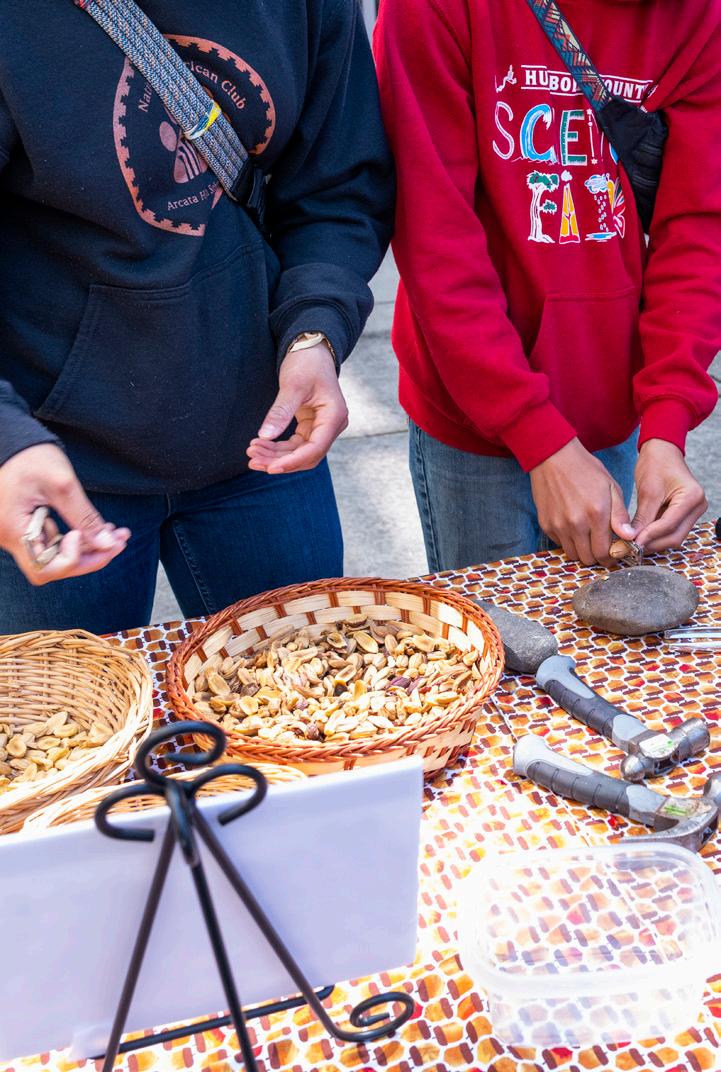

LIFE & ARTS NEWS
04 Indigenous Foods Festival
08 COVID rise on campus, where to fnd resources
10 27th annual Campus and Community Dialogue on Race
11 New coordinator hired for advising free speech demonstrations on campus
14 Earth Drifter spices up Humboldt’s taste buds
17 Celebrate Hispanic Heritage Month with Community Tardeada
20 Your zodiac sign’s perfect Halloween costume
22 Beyond the bedroom: breaking the silence on sex therapy
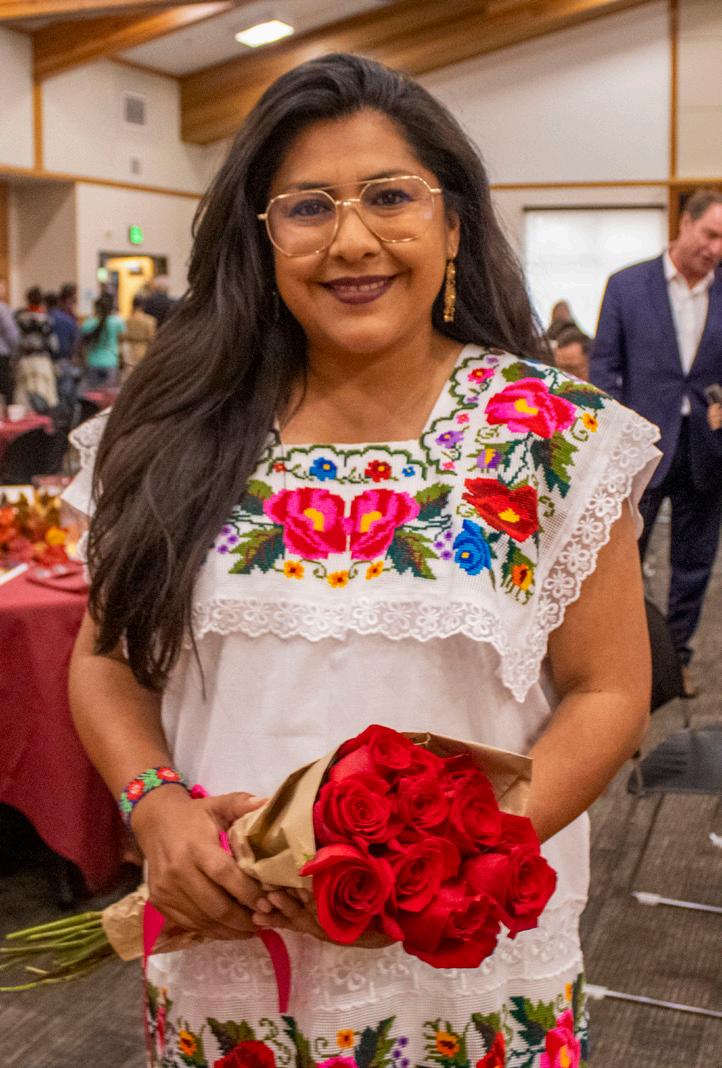
ESPAÑOL
03 Trump corta fondos para Instituciones al Servicio de los Hispanos
05 Festival de Alimentos Indígenas
07 Brenda Pérez gana el premio Demócrata del Año en Humboldt
15 Earth Drifter enchila al paladar de Humboldt
El Leñador is an English and Spanish newspaper produced by Cal Poly Humboldt students. Our staff cover and provide news to Latinx and other diverse communities on campus and in Humboldt County. We are committed to providing relevant news and expanding the representations and stories told about people of color and other marginalized groups. Our work helps create more social, political and cultural diversity in local media.
El Leñador es un periódico en español e inglés producido por estudiantes de Cal Poly Humboldt. Nuestro personal cubre y provee noticias a la comunidad Latine y otras comunidades diversas en el campus y en el condado de Humboldt. Estamos comprometidos a brindar noticias actuales y ampliar la representación y las historias que son contadas sobre la gente de color y otros grupos marginados. Nuestros esfuerzos ayudan a crear una diversa presencia social, política y cultural en los medios locales.


Editor in Chief
Noelle Doblado
Spanish Editor
Maryanne Casas-Perez
News Editor
Salvador Sandoval-Garduno
Copy Editor
Julia Rants
Layout/Design
Pamela Hernandez
Kasandra Arreola
Julia Rants
Writers/Contributors
Salvador Sandoval-Garduno
Pamela Hernandez
Kasandra Arreola
Julia Rants
Ocean Edgar
Jessica De Laguna
Gina Muñoz
Jordan Pangelinan
Andrea Merezko
Translators
Osvaldo Bustos Perez
Laura Sanchez
Salvador Sandoval-Garduno
Distribution
Pamela Hernandez
Salvador Sandoval-Garduno
Faculty Advisor
Andrea Juarez
Front Cover/Primera Página:
photo by Noelle Doblado foto por Noelle Doblado
To advertise with us, email ellenador.ads@gmail.com
El Leñador staf can be reached at el-lenador@humboldt.edu
Trump cuts funds for Hispanic Serving Institutions
How will Cal Poly Humboldt be impacted?
by Noelle Doblado
On Wed. Sept. 10, the Trump administration decided to cut funding for Hispanic Serving Institutions (HSI). These cuts will affect colleges and universities where the undergraduate student population is at least 25% Latine descent. In both the fall 2024 and spring 2025 semesters, Cal Poly Humboldt’s enrollment demographic states about 28% of all students identified as Hispanic or Latino. Currently 21 out of 22 CSU campuses are designated HSIs and Cal Poly Humboldt has been one since October 2013.
U.S. Secretary of the department of Education Linda McMahon stated on Sept. 10 that the department of Education will eliminate $350 million in grants to HSIs.
“Discrimination based upon race or ethnicity has no place in the United States. To further our commitment to ending discrimination in all forms across federally supported programs, the Department will no longer award Minority-Serving Institution grants that discriminate by restricting eligibility to institutions that meet government-mandated racial quotas,” said McMahon in her address.
Aileen Yoo, director of News and Information, said CPH currently has about $3 million in funding for these impacted programs
that started in the 2023-2024 academic year.
The university said they can not provide specifics to how many and which programs are impacted because funds come from a wide range of sponsors, from small nonprofit organizations to federal agencies. Yoo explained that because of this, many awards are not explicitly labeled as HSI grants, making it difficult to calculate how much funding was related to HSI status, or to identify which specific campus programs have directly or indirectly benefited from those funds.
“We are committed to ensuring all students continue to receive the support and resources they need to succeed,” Yoo said. “For now, we remain focused on our mission to serve all students and will keep our stakeholders informed as this situation develops.”
Yaneyry Delfin Martinez is the director of Scholars Without Borders, a space on campus for undocumented and mixed-status students to find general and academic support. Delfin Martinez finds this decision to be alarming for the future of higher education.
“I want to emphasize that the HSI grant has served all students, not just Latinos,” Delfin Martinez said. “This loss will impact the quality of education across the CSU system.”
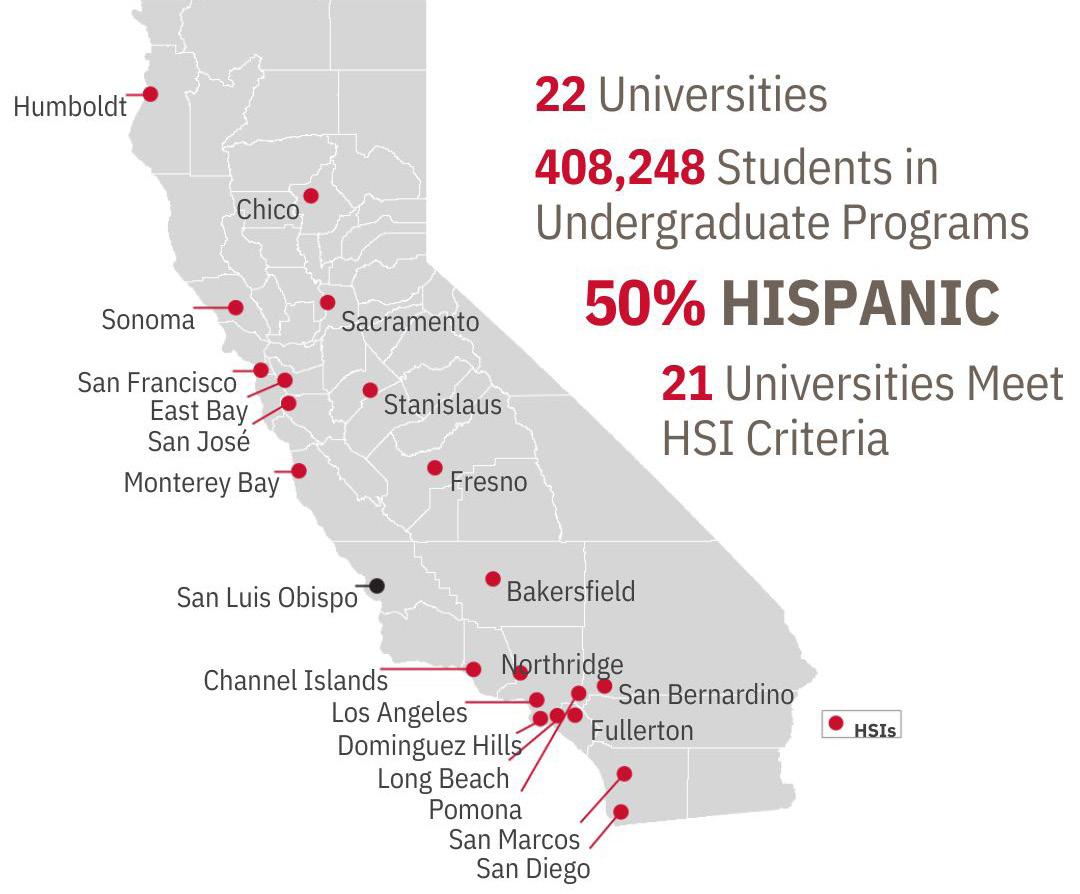
Graphic by the California State University system Marketing and Communications.
Delfin Martinez believes there needs to be more communication to students about how this will impact our campus moving forward.
“This cut in funding is another attempt from this [presidential] administration to attack latinos,” Delfin Martinez said. “The administration needs to do a better job of protecting the education of their students. Especially with the passing of the legalization of racial profiling when it comes to ICE, the university needs to become better informed. They seem at a lost right now.”
Executive Director of Centro del Pueblo
and Coordinator of CPH’s El Centro Academico Cultural de Humboldt, Brenda Pérez, shares the added stress this change puts on the Latine community.
“I think that the university leadership has been preparing for this type of action and decisions from the federal government,” Pérez said. “What is going to affect of course, and impact is in the already thick environment around support for Hispanic students, Latine students, Chicanx students, or the way we feel are not supported in institutions.”
Trump corta fondos para Instituciones al Servicio de los Hispanos
¿Qué impacto tendrá en CPH?
Escrito por Noelle Doblado y traducido por Salvador Sandoval-Garduno
El miércoles 10 de septiembre, la administración de Trump decidió recortar fondos para Instituciones al Servicio de los Hispanos (HSI). Estos recortes afectarán a las universidades y colegios donde al menos el 25% de la población estudiantil de pregrado sea de ascendencia latine. En los semestres de otoño 2024 y primavera 2025, la demografía de inscripción de Cal Poly Humboldt indica que aproximadamente el 28% de todos los estudiantes se identificaron como hispanos o latinos. Actualmente, 21 de los 22 campus del CSU están designados como instituciones al servicio de los hispanos (HSI), y Cal Poly Humboldt ha sido uno desde octubre de 2013.
La secretaria de Educación de Estados Unidos, Linda McMahon, declaró el 10 de septiembre que el Departamento de Educación eliminará $350 millones en subvenciones para las instituciones al servicio de los hispanos (HSI).
“Discriminación por motivos de raza o etnia no tiene lugar en los Estados Unidos. Para
promover nuestro compromiso de terminar con la discriminación en todas sus formas en los programas apoyados por el gobierno federal, el departamento ya no otorgará subvenciones a las instituciones al servicio de minorías que discriminen al restringir la elegibilidad a aquellas instituciones que cumplan con cuotas raciales establecidas por el gobierno”, dijo McMahon en su discurso.
Aileen Yoo, Directora de Noticias e Información, dijo que CPH actualmente tiene aproximadamente $3 millones en financiamiento para estos programas afectados que comenzaron en el año académico 2023-2024.
La universidad dijo que no puede proporcionar detalles sobre cuántos ni cuáles programas se verán afectados, ya que los fondos provienen de una amplia variedad de patrocinadores, desde pequeñas organizaciones sin fines de lucro hasta agencias federales. Yoo explicó que, debido a esto, muchas subvenciones no
están explícitamente identificadas como fondos HSI, lo que dificulta calcular cuánto financiamiento está relacionado con el estatus HSI o identificar qué programas específicos del campus se han beneficiado directa o indirectamente de esos fondos.
“Estamos comprometidos a garantizar que todos los estudiantes continúen recibiendo el apoyo y los recursos que necesitan para tener éxito”, dijo Yoo. “Por ahora, seguimos enfocados en nuestra misión de atender a todos los estudiantes y mantendremos informados a nuestros grupos de interés a medida que esta situación evolucione.”
Yaneyry Delfin Martinez es la directora de Scholars Without Borders, un espacio en el campus para que estudiantes sin documentos y de estatus mixto encuentren apoyo general y académico. Delfin Martínez considera alarmante esta decisión para el futuro de la educación superior.
“Quiero enfatizar que la subvención HSI ha beneficiado a todos los estudiantes, no solo a los latinos”, dijo Delfin Martínez. “Esta pérdida afectará la calidad de la educación en todo el sistema CSU.”
Delfin Martínez cree que se necesita mayor comunicación con los estudiantes sobre cómo esto impactará nuestro campus en el futuro.
“Este recorte de fondos es otro intento de esta administración [presidencial] de atacar a los latinos”, dijo Delfin Martínez. “La administración necesita hacer un mejor trabajo protegiendo la educación de sus estudiantes. Especialmente con la aprobación de la legalización del perfil racial por parte de ICE, la universidad necesita informarse mejor. Parece que están perdidos en este momento.”
Directora ejecutiva de Centro del Pueblo y coordinadora de El Centro Académico Cultural de Humboldt de CPH, Brenda Pérez, comparte el estrés adicional que este cambio genera en la comunidad latina.
“Creo que el liderazgo de la universidad se ha estado preparando para este tipo de acciones y decisiones del gobierno federal”, dijo Pérez. “Lo que va a afectar, por supuesto, e impactar es el ambiente ya complicado en torno al apoyo a los estudiantes hispanos, latinos, chicanx, o la forma en que sentimos que no somos apoyados en las instituciones.”
Indigenous Foods Festival: Food, community and artistry
by Julia Rants

The third Rou Dalagurr Food Sovereignty Lab and Traditional Ecological Knowledges Institute's Indigenous Foods Festival will be held on Oct. 11 from 10 a.m. to 3 p.m. in Wiyot Plaza, located between Cal Poly Humboldt’s Behavioral and Social Sciences building and the Native American Forum. The foods festival celebrates Indigenous food sovereignty by bringing together organizations to host tables featuring food, art, film screenings, demonstrations and workshops.
Delaney Schroeder-Echavarria is a graduate student and program coordinator for the Ghvtlh-k’vsh shu'-srnelh-'i (Kelp Guardians) Sea Grant with the Tolowa Dee-ni’ Nation and the Rou Dalagurr Food Sovereignty Lab (FSL) & Traditional Ecological Knowledges Institute. SchroederEchavarria emphasizes the importance of the festival in hosting conversations within a communal space and the educational aspects.
“It’s a celebration of our traditional foods. A majority of the foods that we eat come from the Americas, our traditional and Indigenous foods of the Americas. And a lot of people don’t realize that or recognize that. A lot of people think, ‘oh, tomatoes, Italy,’ but Italians didn’t have tomatoes until colonization,” Schroeder-Echavarria said. “People don’t think about things like that, and I think it’s very important for us as Indigenous peoples and as community members to use that space as a place for connecting with community and also for educating community in a fun and safe environment within Wiyot plaza.”
The festival creates a space for people to come together and share the work that has been implemented, the community initiatives in place to uplift Indigenous food sovereignty and connections to food and culture.
Covin Sigala, a senior Native American studies major at CPH and student assistant for the FSL, reflected on last year’s festival.
“The Indigenous Foods Festival is
important because it brings a lot of people together, especially our community, our local Native community, onto the college campus. And we get to share what we made with the community,” Sigala said. “And it’s just overall a good time, people get to see each other, eat food, and see how food is processed and cooked.”
For the first time, the FSL will be open as part of the festival, marking a significant moment for students, community, and faculty who have worked to make the lab a working space for Indigenous led initiatives.
“This will be the first year that we actually get to have workshops in here and people get to go see it, so it’s really exciting,” Schroeder-Echavarria said.
Alongside tabling and food vendors, the lab hosts a chef in residence each year to come visit, teach FSL staff and hold community workshops. This year’s chosen chef is Crystal Wahpepah, a member of the Kickapoo Nation of
Oklahoma and owner of Wahpepah’s Kitchen in Oakland.
Having the lab open during the festival will allow for the in-person transfer of Indigenous knowledge and ways of preparing food to the community.
The overarching goal of the festival is to celebrate the many Indigenous food sovereignty programs local and beyond, to bring these initiatives together and educate people on their work.
“We’re going to be really just showcasing the beauty of Indigenous people and our connections with food beyond Turtle Island, beyond just Humboldt and I think that students need to know everyone is welcome, come by, check it out, sign up to volunteer if you can, tell other people about it.”
For more information on the festival and volunteer opportunities, visit: www. humboldt.edu/food-sovereignty/ indigenous-foods-festival
Indigenous Foods Festival 2022. Photo by Kellie Brown
Festival de Alimentos Indígenas: Comida, comunidad y arte
Escrito por Julia Rants y traducido por Maryanne Casas-perez
El tercer Festival de Alimentos Indígenas del Rou Dalagurr Food Sovereignty Lab y el Traditional Ecological Knowledges Institute se llevará a cabo el 11 de octubre de 10 a.m. a 3 p.m. en la Plaza Wiyot, ubicada entre el edificio de Ciencias del Comportamiento y Sociales y el Native American Forum de Cal Poly Humboldt.
El festival celebra la soberanía alimentaria indígena reuniendo a organizaciones que presentarán puestos con alimentos, arte, proyecciones de cine, demostraciones y talleres.
Delaney Schroeder-Echavarria, estudiante de posgrado y coordinadora del programa Ghvtlh-k’vsh shu'-srnelh'i (Kelp Guardians) Sea Grant con la Nación Tolowa Dee-ni’ y el Rou Dalagurr Food Sovereignty Lab (FSL), destacó la importancia del festival como un espacio de conversación comunitaria y de educación.
“Es una celebración de nuestros alimentos tradicionales. La mayoría de los alimentos que comemos provienen de las Américas, nuestros alimentos tradicionales e indígenas de las Américas. Mucha gente no se da cuenta de eso ni lo reconoce. Muchos piensan,” ‘oh, los tomates, Italia’, pero los italianos no tenían tomates hasta la colonización,” dijo Schroeder-Echavarria. “La gente no piensa en esas cosas, y creo que es muy importante para nosotros, como pueblos indígenas y miembros de la comunidad, usar este espacio para conectar y también para educar en un ambiente divertido y seguro dentro de la Plaza Wiyot.”
El festival crea un espacio para compartir iniciativas comunitarias que buscan fortalecer la soberanía alimentaria indígena y los lazos entre comida y cultura.
Covin Sigala, estudiante de último año de estudios nativos americanos en CPH y asistente en el Food Sovereignty Lab (FSL), recordó el festival del año pasado.
“El Festival de Alimentos Indígenas es
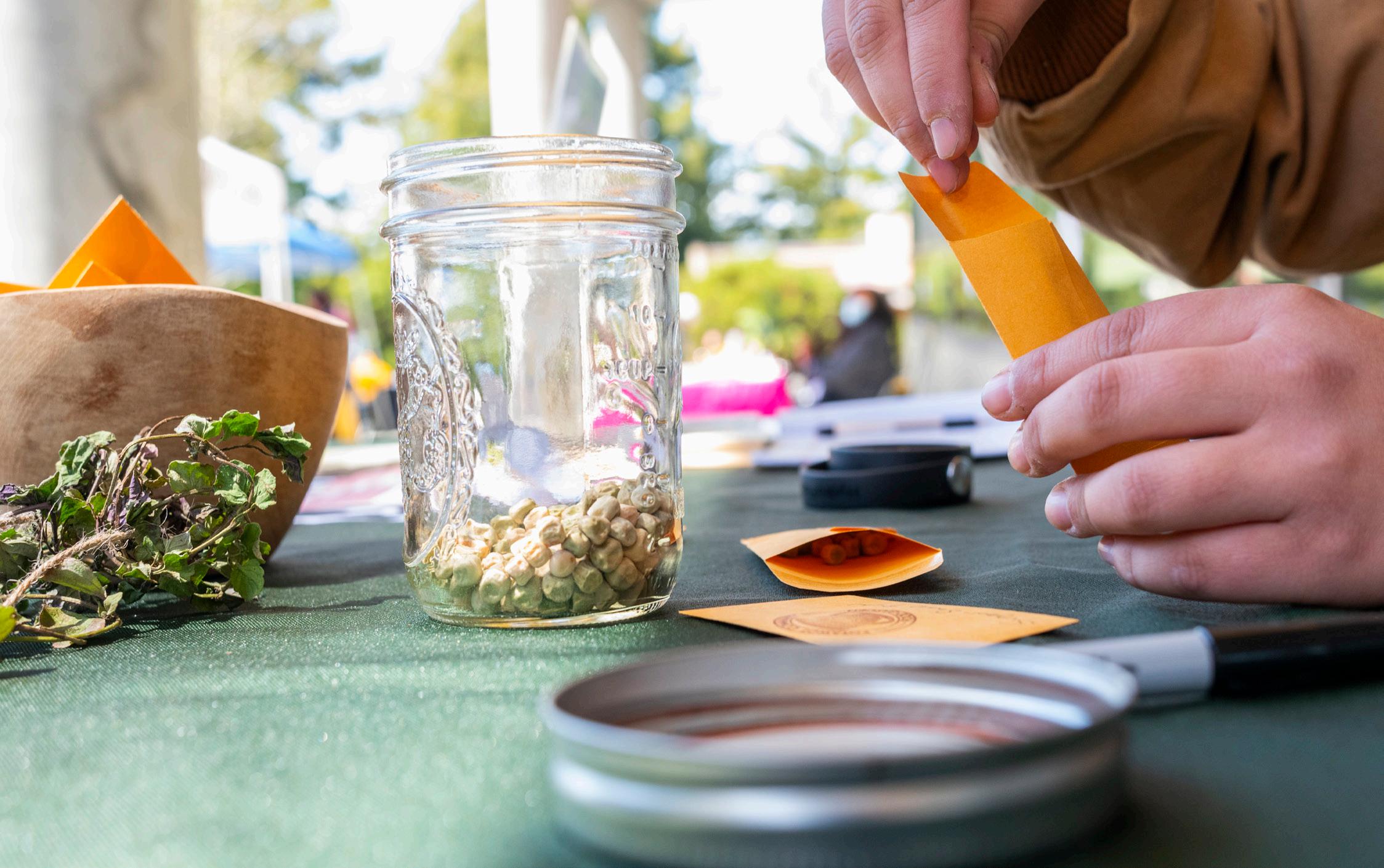
importante porque reúne a mucha gente, especialmente a nuestra comunidad local nativa, dentro del campus universitario. Y podemos compartir lo que preparamos con la comunidad,” dijo Sigala. “En general, es un buen momento, la gente se encuentra, come y ve cómo se procesan y cocinan los alimentos.”
Por primera vez, el FSL estará abierto como parte del festival, un momento significativo para estudiantes, comunidad y profesores que han trabajado para que el laboratorio funcione como un espacio de iniciativas lideradas por pueblos indígenas.
“Este será el primer año en que realmente podremos tener talleres
aquí, y la gente podrá verlo; es muy emocionante", dijo SchroederEchavarria.
Además de los puestos de comida y organizaciones, el laboratorio recibe cada año a un chef residente que visita el espacio, enseña al personal del FSL y ofrece talleres comunitarios. Este año la chef elegida es Crystal Wahpepah, miembro de la Nación Kickapoo de Oklahoma y dueña de Wahpepah’s Kitchen en Oakland.
Tener el laboratorio abierto durante el festival permitirá la transferencia directa de conocimientos indígenas y de técnicas culinarias hacia la comunidad.
El objetivo principal del festival es celebrar los múltiples programas de
soberanía alimentaria indígena, tanto locales como de otras regiones, reunir estas iniciativas y educar al público sobre su labor.
“Vamos a mostrar la belleza de los pueblos indígenas y nuestras conexiones con la comida más allá de Turtle Island, más allá de Humboldt. Y creo que los estudiantes deben saber que todos son bienvenidos. Vengan, echen un vistazo, apúntese como voluntarios si pueden, cuenten a otros sobre el evento.”
Para más información sobre el festival y oportunidades de voluntariado, visita: www.humboldt.edu/food-sovereignty/ indigenous-foods-festival
Festival de Comidas Indígenas 2022. Foto de Kellie Brown
Brenda Pérez wins Humboldt’s Democrat of the Year award
by Kasandra Arreola
The Humboldt Democratic Central Committee announced Brenda Pérez as Democrat of the Year. Pérez received the award on Sept. 27, 2025, at the Sequoia Conference Center in Eureka, making Humboldt history as the first Indigenous migrant woman to receive the award.
“Our Democrat of the Year event is a fundraiser for us where we try to elevate someone from the community that represents what would be democratic party values,” said Eureka City Council member Mario Fernandez.
Pérez is from Chalchicomula, Mexico, where her interest in politics was shaped from a young age by her hometown. Perez was inspired by Zapatismo, a movement and commitment to Indigenous traditions and self-determination.
“The environment was very much in constant debate and discussion about how to transform the country at the time. As a child, listening to these conversations on how the Cuban revolution was won, Zapatismo it was just nourishing to my spirit to believe that another space was possible, another type of relationship was possible,” Pérez said.
Pérez has a multitude of accomplishments in advocacy and activism within the community that extend far beyond Humboldt County.
“Seeing the work that Brenda's done with and through Centro Del Pueblo, how would we not want to recognize this person,” Fernandez said.
Pérez attended the National Autonomous University of Mexico (UNAM) in 2016, where she began her PhD research on the relationship between illegal plants and the people working in the industries that grow them. In 2017, UNAM recommended she take on guest research at Cal Poly Humboldt.
After her research, Pérez flourished in her new Humboldt community. She led many successful campaigns, including one that contributed to Humboldt
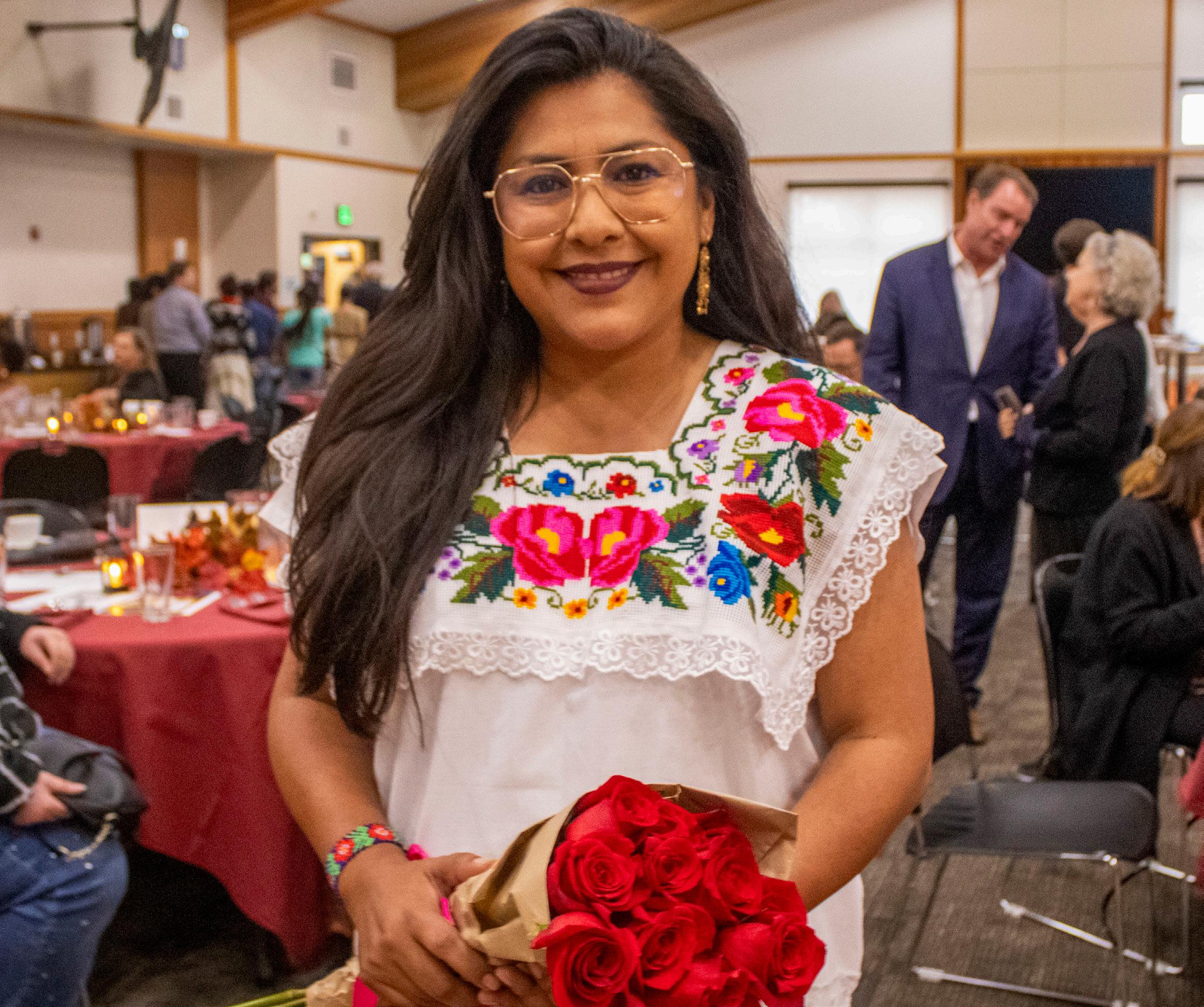
County’s local sanctuary law called the Measure K Sanctuary Ordinance. This law prevents local employees from assisting federal immigration enforcement by disseminating information about an individual's release status or investigating citizenship status.
Pérez also had an active role in the closure of the Yuba City detention center in 2023 and has continued to advocate and create spaces for voices to be heard.
Among many community efforts,
Pérez is the coordinator at Cal Poly Humboldt for El Centro Académico
Cultural de Humboldt. The space primarily works with students of Latine descent to support, serve and affirm cultural identities. Student assistant Irma Rodriguez at El Centro shared her experience working alongside Pérez.
“She cares for everyone in the community even if you don’t agree with her. She's a very selfless person and does a lot for the community, not just for the school,
but outside of the school. She tries to make everyone feel included,” Rodriguez said.
Pérez continues to advocate for the community in an effort to uplift the voices not being heard.
“People have their voice,” Pérez said. “You need to listen to that voice and be humble, and mindful, and respectful and foster an environment so that we get to listen to that voice and transform that voice into action.”
Brenda Pérez honored at the Sequoia Conference Center in Eureka on Sept. 27. Photo by Ocean Edgar
Brenda Perez fue homenajeada en el Centro de Conferencias Sequoia en Eureka el 27 de Sept. Foto por Ocean Edgar
Brenda Pérez gana el premio Demócrata del Año en Humboldt
Escrito
por
Kasandra Arreola y traducido por Maryanne Casas-Perez
El Comité Central Demócrata de Humboldt anunció a Brenda Pérez como la Demócrata del Año. Pérez recibió el premio el 27 de septiembre del 2025 en el Sequoia Conference Center en Eureka, haciendo historia en Humboldt como la primera mujer migrante indígena en recibir este reconocimiento.
“Nuestro evento de Demócrata del Año es una recaudación de fondos en la que tratamos de destacar a alguien de la comunidad que represente lo que serían los valores del Partido Demócrata,” dijo el concejal de Eureka, Mario Fernández.
Pérez es originaria de Chalchicomula,
Pérez tiene una amplia trayectoria en defensa y activismo dentro de la comunidad, que se extiende mucho más allá del condado de Humboldt.
"Al ver el trabajo que Brenda ha hecho con y a través del Centro del Pueblo, ¿cómo no íbamos a reconocerla?” dijo Fernández. En 2016, Pérez asistió a la Universidad Nacional Autónoma de México (UNAM), donde inició su investigación doctoral sobre la relación entre las plantas ilegales y las personas que trabajan en las industrias que las cultivan. En 2017, UNAM le recomendó realizar investigación como invitada en Cal Poly Humboldt.
continuado abogando por crear espacios donde se escuchen las voces de la comunidad.
Entre sus múltiples esfuerzos, Pérez es la coordinadora de El Centro Académico Cultural de Humboldt en Cal Poly Humboldt. Este espacio trabaja principalmente con estudiantes de ascendencia latina para apoyar, servir y afirmar sus identidades culturales. La asistente estudiantil Irma Rodríguez compartió su experiencia trabajando junto a Pérez.
“Ella se preocupa por todos en la comunidad, incluso si no estás de acuerdo con ella. Es una persona muy generosa y hace mucho por la comunidad, no solo por la universidad, sino también fuera de ella. Trata de que todos se sientan incluidos,”



Pérez continúa defendiendo a la comunidad con el fin de amplificar las
“La gente tiene su voz,” dijo Pérez. “Necesitas escuchar esa voz y ser humilde, consciente y respetuosa, y fomentar un entorno para que podamos escucharla y




Joey Bragg
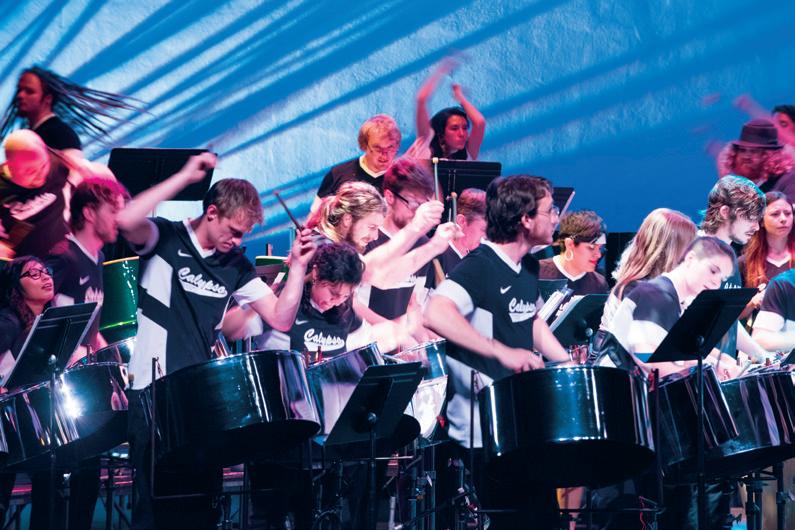


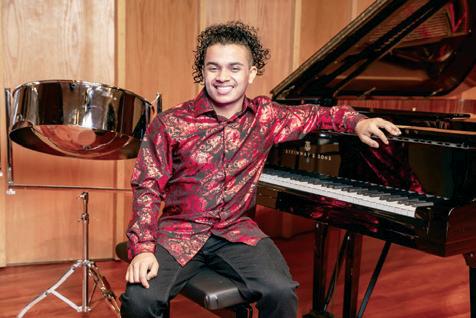
Masters of the Steel MAY 2
Recent COVID rise on campus: Where to fnd resources
by Gina Muñoz
As of Sept. 22, one in every 25 people in California are actively infectious, and there are around 857,000 new daily cases nationwide, according to estimates by the Pandemic Mitigation Collaborative (PMC19).
The Centers for Disease Control and Prevention (CDC) tracks community viral activity through wastewater systems. As of Sept. 14–20, the tracker reported Humboldt County at a “very high” level of COVID-19 activity.
Melissa Hutsell from the university’s Marketing and Communications Department, said that from August to Sept. 23, there were 17 positive COVID-19 tests out of 66 processed by the Student Health and Wellbeing Service Lab (SHWS). That number does not include students who tested at home or did not test at all. Hutsell stated these numbers are similar to last year’s during this time. Additionally, three university employees have reported positive tests through the school’s COVID-19 reporting form or by emailing hr-covid-coordinator@ humboldt.edu.
Well-fitting masks, which have been proven to be the most effective way to reduce the spread of COVID-19 and other airborne illnesses, are not readily available on campus. However, if a student tests positive at the SHWS center, they can be provided with a mask.
There are currently no free tests provided on campus. Tests can be found at the price of $20 for two tests in the following vending machine location:
-Nelson Hall East, across from the Goodwin Forum
-The Housing Cashier on the third floor of the Jolly Giant Commons
-The College Creek Mail Room lobby
-First floor of the Student Activities Center, next to the entrance of The Depot
-The Creekview Lounge -Hinarr Hu Moulik dorms
“Students who are showing symptoms can be seen by a health provider at SHWS, and if needed, tested through the lab for just $6,” Hutsell said. “Anytime we have been able to acquire free tests, we offer these in our vending machines at no cost.”
According to the university’s COVID Health and Safety Guidance page, as of January 2024, anyone with COVID-19 is required to wear a mask indoors for 10 days after symptoms begin or the first COVID test was taken, but can remove masks after two consecutive negative tests.
Students, faculty and staff with a positive COVID test can return to work and school “after at least 24 hours have passed since a fever of 100.4 degrees Fahrenheit or higher has resolved without the use of feverreducing medication.” Those who are asymptomatic that test positive can return to work after 24 hours if no symptoms develop.
On Sept. 16, Housing and Residence Life emailed dorm residents about the updated policy, but did not issue a campus-wide notice. El Leñador asked why.
“The SHWS notified Housing officials about a rise in cases, and out of an abundance of caution, a message was sent. We tend to see spikes in communal living areas, where students are in close quarters and share bathrooms and sleeping spaces,” Hutsell said. “Students are encouraged to notify Resident Advisors about positive COVID tests, so Housing officials can promptly inform the community and residents can take appropriate precautions when needed.”
The university added that people
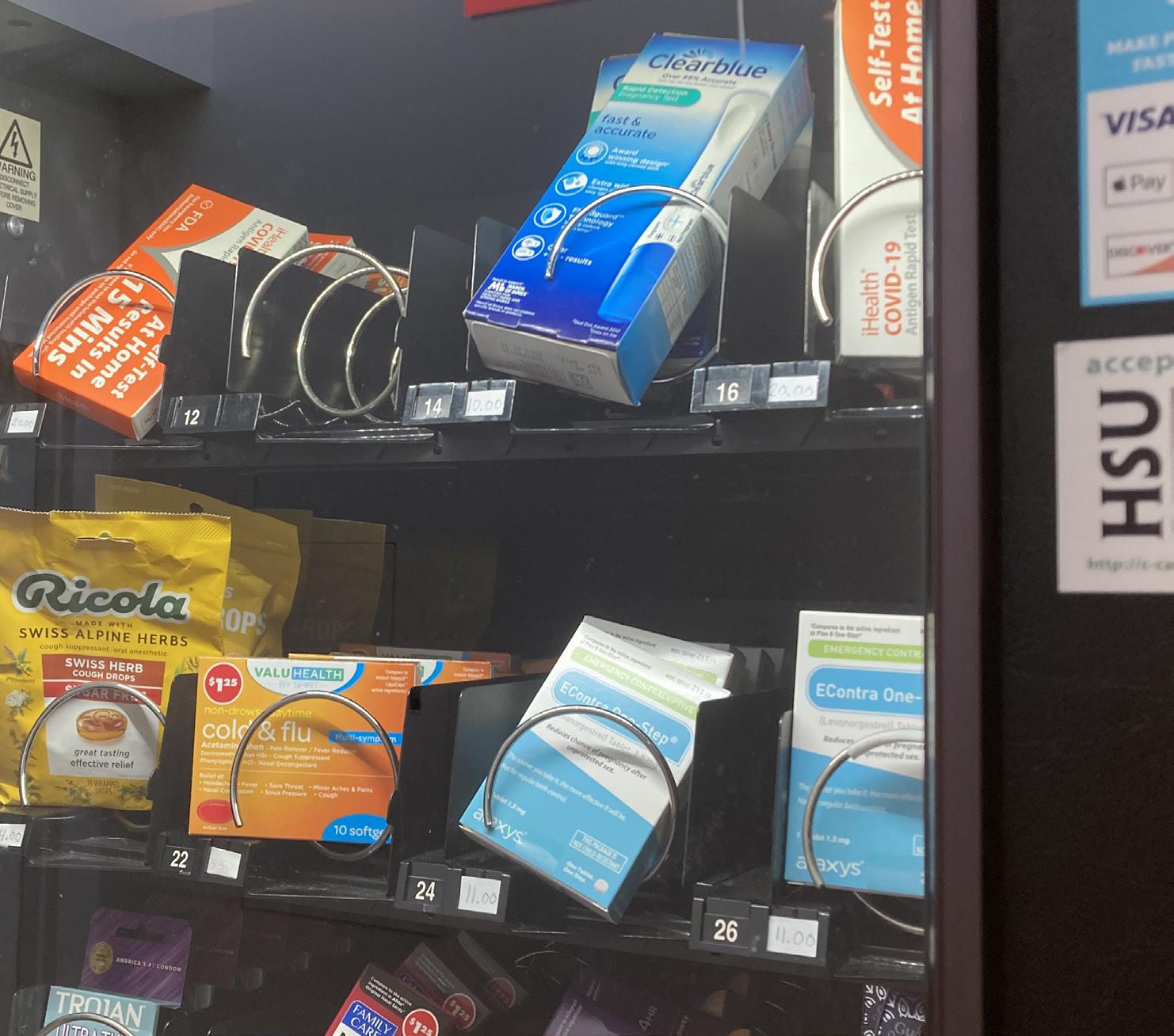
who come in contact with a COVIDpositive person “are well are encouraged (but not required) to wear a mask around folks who are at risk for serious COVID infection (elderly, ill, immunocompromised, etc) and test on day 5 after exposure.”
Khyla Bennet, a junior criminology major, reached out to the Housing and Residence Life department regarding their email addressing the COVID cases on campus but hasn’t received a response.
“I thought it was pretty negligent of the school because asymptomatic people can still spread COVID,” Bennet said. “The school is underestimating human behavior, most people nowadays automatically think that no symptoms means no mask.”
Bennet said these policies are making her reconsider going to class.
“It’s not fair for students and faculty
who do their part, to go to school and work and wonder if the person next to them has COVID or has anxiety around getting sick.”
Most clinics in Humboldt County and some pharmacies such as CVS Arcata, McKinleyville and Eureka, offer COVID-19 vaccines and booster shots. To schedule an appointment call the clinic, pharmacy or go to the following website to view available places: myturn.ca.gov/
The Mask Bloc, a nationwide group providing free COVID-19 supplies, launched a Humboldt chapter in summer 2024 after the Siemens Hall occupation. Students can request free masks, tests, and informational zines through the group’s Instagram: @humboldtmaskbloc
COVID tests inside a vending machine on campus in Nelson Hall East. Photo by Gina Muñoz
Brote reciente de COVID en el campus: Dónde encontrar recursos
Escrito por Gina Muñoz y traducido por Maryanne Casas-Perez
Desde el 22 de septiembre, uno de cada 25 personas en California está actualmente infectada, y se estiman alrededor de 857,000 nuevos casos diarios a nivel nacional, según el Pandemic Mitigation Collaborative (PMC19).
Los Centros para el Control y la Prevención de Enfermedades (CDC) rastrean la actividad viral comunitaria a través de sistemas de aguas residuales. Entre el 14 y el 20 de septiembre, el rastreador reportó que el condado de Humboldt se encontraba en un nivel “muy alto” de actividad de COVID-19. Melissa Hutsell, del Departamento de Marketing y Comunicaciones de la universidad, informó que entre agosto y el 23 de septiembre hubo 17 pruebas positivas de COVID-19 de un total de 66 procesadas por el Student Health and Wellbeing Service Lab (SHWS). Esa cifra no incluye a estudiantes que se hicieron pruebas en casa o que no se hicieron ninguna. Hutsell añadió que estos números son similares a los del año pasado en la misma fecha. Además, tres empleados de la universidad reportaron resultados positivos a través del formulario de notificación de COVID de la escuela o enviando un correo a hrcovid-coordinator@humboldt.edu.
Los cubrebocas de buen ajuste, que han demostrado ser la forma más eficaz de reducir la propagación del COVID-19 y otras enfermedades transmitidas por el aire, no están disponibles de manera general en el campus. Sin embargo, si un estudiante da positivo en el centro SHWS, se le puede proporcionar una mascarilla.
Actualmente, no se ofrecen pruebas gratuitas en el campus. Se pueden encontrar a un precio de $20 por dos pruebas en las siguientes máquinas expendedoras:
Nelson Hall East, enfrente del -Goodwin Forum
-Caja de Housing en el tercer piso de Jolly Giant Commons
-Lobby de College Creek Mail Room
-Primer piso del Student Activities Center, junto a la entrada de The Depot
-Creekview Lounge
-Dormitorios Hinarr Hu Moulik
“Los estudiantes que presenten síntomas pueden ser atendidos por un proveedor de salud en SHWS y, si es necesario, hacerse una prueba de laboratorio por solo $6,” dijo Hutsell. “Cada vez que hemos podido obtener pruebas gratuitas, las ofrecemos en nuestras máquinas expendedoras sin costo.”
Según la página de Guía de Salud y Seguridad por COVID de la universidad, desde enero de 2024, cualquier persona con COVID-19 debe usar mascarilla en interiores durante 10 días después de la aparición de síntomas o de la primera prueba positiva, aunque puede retirársela tras dos pruebas negativas consecutivas.
Los estudiantes, profesores y empleados con una prueba positiva pueden regresar al trabajo y a clases “después de al menos 24 horas sin fiebre de 100.4 °F o más, sin el uso de medicamentos para reducirla.” Las personas asintomáticas que dan prueba positiva pueden regresar a trabajar después de 24 horas si no desarrollan síntomas.
El 16 de septiembre, Housing and Residence Life envió un correo a residentes de los dormitorios sobre la política actualizada, pero no emitió un aviso a todo el campus. El Leñador preguntó por qué.
“El SHWS notificó a Housing sobre el aumento de casos y, por precaución, se envió un mensaje. Suele haber picos en áreas de vivienda comunal, donde los estudiantes están en espacios reducidos y comparten baños y dormitorios,” dijo Hutsell. “Se alienta a los estudiantes a notificar a sus Resident Advisors sobre pruebas positivas, para qué Housing pueda informar a la comunidad y los residentes tomen las precauciones necesarias.”
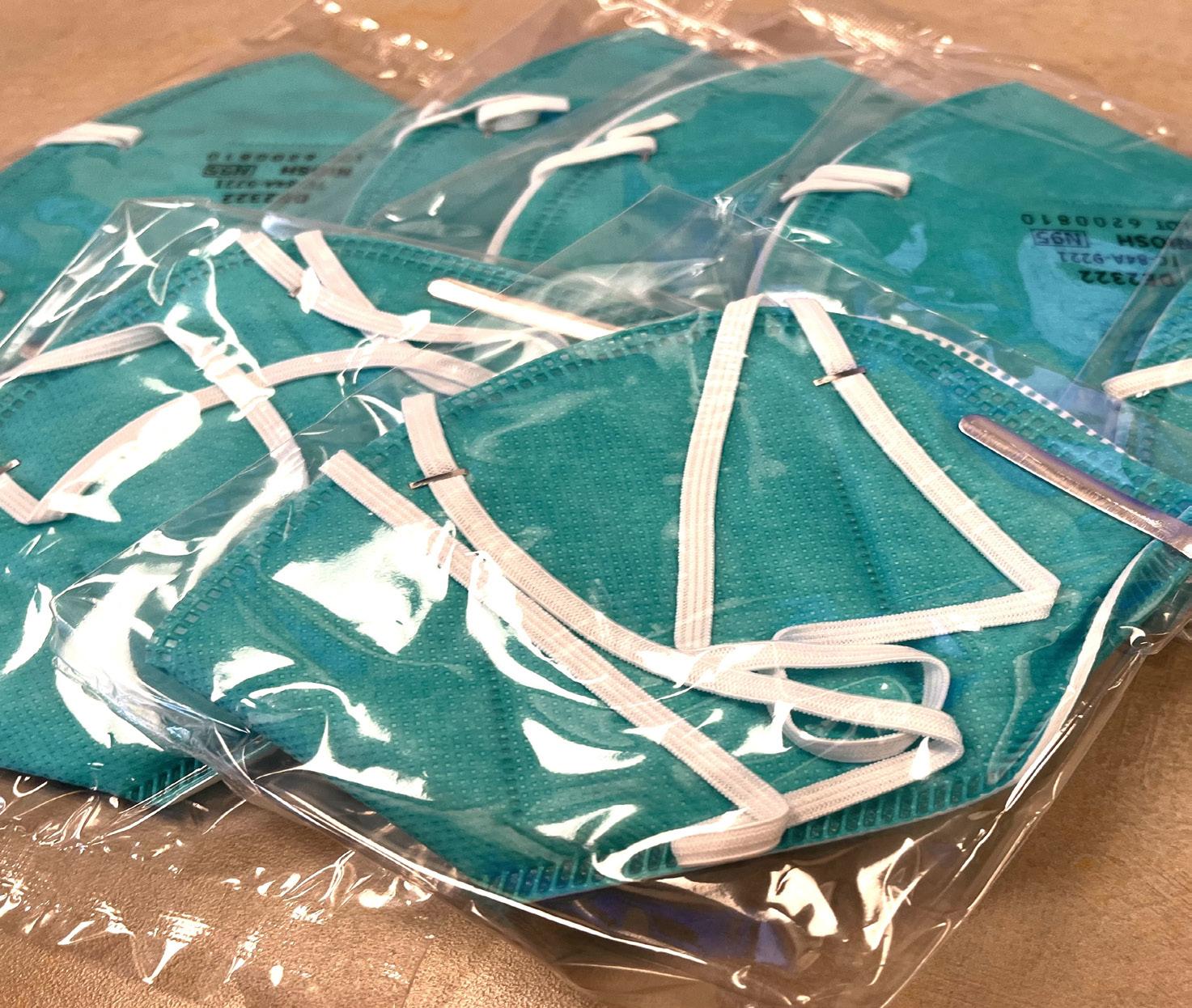
KN95 para protegerse contra la COVID-19. Foto de Noelle Doblado
La universidad añadió que las personas en contacto con alguien positivo en COVID “que se encuentren bien son alentadas (pero no obligadas) a usar mascarilla alrededor de personas en riesgo de enfermedad grave (adultos mayores, enfermos, inmunocomprometidos, etc.) y a hacerse una prueba el día 5 tras la exposición.”
Khyla Bennet, estudiante de tercer año de criminología, contactó a Housing and Residence Life sobre el correo referente a los casos de COVID en el campus, pero no ha recibido respuesta.
“Me pareció bastante negligente de parte de la escuela porque las personas asintomáticas todavía pueden contagiar COVID,” dijo Bennet. “La escuela está sobre estimando el comportamiento humano, la mayoría de la gente piensa que no tener síntomas significa que no tienen que usar máscara.”
Bennet agregó que estas políticas la hacen reconsiderar asistir a clases.
“No es justo para los estudiantes
y profesores que hacen su parte, ir a la escuela y al trabajo y preguntarse si la persona a su lado tiene COVID o sentir ansiedad por enfermarse.”
La mayoría de las clínicas del condado de Humboldt y algunas farmacias como CVS en Arcata, McKinleyville y Eureka, ofrecen vacunas y refuerzos contra el COVID-19. Para programar una cita se puede llamar a la clínica, a la farmacia o visitar la página: myturn.ca.gov/
The Mask Bloc, un grupo nacional que provee suministros gratuitos de COVID-19, lanzó un capítulo en Humboldt el verano de 2024 tras la ocupación de Siemens Hall. Los estudiantes pueden solicitar cubrebocas, pruebas y fanzines informativos gratuitos a través de su Instagram: @ humboldtmaskbloc.
Mascarillas
27th Annual
27th Annual Campus and Community Dialogue on Race to be held Oct. 20-24
by Pamela Hernandez
The 27th Annual Campus and Community Dialogue on Race will be taking place at Cal Poly Humboldt, Oct. 20-24. CDOR is centered around bringing together students, faculty and staff to discuss topics around race.
This year’s theme, dis/connecting to reconnect- everyday rest, refusal, resistances, is meant to platform and affirm cultural identities while creating a space for healing, learning and reflecting as a collective. The solidus (/) in CDOR’s theme is inspired from Asian American studies, representing duality and tension, while holding a space for both.
“CDOR is important because it creates space for dialogue and awareness, giving a platform to those whose voices are often unheard yet vital to our communities. It uplifts counternarratives, honoring the richness and complexity of our shared experiences,” said Frank Herrera, the coordinator at the Social, Justice, Equity and Inclusion center. “We invite our broader community to join us in building understanding, challenging inequities, and transforming our world into a place of equity and belonging, where everyone has the opportunity to thrive.”
CDOR is a call to action while also being a call to pause, reminding us that healing
and rest are acts of resistance. CDOR will be reflecting on stepping away and disconnecting from trends and overconsumption habits that shape our decisions. While these themes are crucial and necessary, there is a big emphasis in reconnection as reclamation by taking a step back from hustle culture and guilt from rest.
Micha Cardenas, a first generation Colombian American, is set to be one of the guest speakers at CDOR. Cardenas is an artist, author and professor of Critical Race & Ethnic Studies at the University of California, Santa Cruz. Her academic monograph Poetic Operations: "Trans of Color Art in Digital Media" was a co-winner of the Gloria Anzaldua Book Prize in 2022. Her use of digital technology is reimaging multicultural feminist artwork and notions of identity. Cardenas is set to speak on Oct. 22.
Adrienne Maree Brown is an author and activist who is passionate about deepening her healing. She is part of the Black Organizing for Leadership and Dignity, at the intersections of political education, community organizing, somatic and Black love. Brown will be focusing on “growing a garden of healing ideas,” that allow us
27º Diálogo Anual en el Campus y
del 20 al 24 de octubre
Escrito por Pamela Hernandez y traducido por Maryanne Casas-Perez
Del 20 al 24 de octubre se llevará a cabo en Cal Poly Humboldt el 27º Diálogo Anual en el Campus y la Comunidad sobre la Raza (CDOR, por sus siglas en inglés). El CDOR se centra en reunir a estudiantes, profesores y personal para dialogar sobre temas relacionados con la raza. El tema de este año, des/conectando para reconectar – descanso cotidiano, rechazo, resistencias, busca dar plataforma y afirmar identidades culturales mientras se crea un espacio colectivo de sanación, aprendizaje y reflexión. La barra inclinada (/) en el tema de CDOR está inspirada en los estudios asiáticoamericanos, representando dualidad y tensión, a la vez que mantiene un espacio para ambas.
“El CDOR es importante porque crea un espacio de diálogo y conciencia, dando plataforma a aquellas voces que a menudo no son escuchadas y que, sin embargo, son vitales
Campus & Community Dialogue on Race
Monday - Friday, October 20 - 24
see full schedule dialogue.humboldt.edu
FEATURED SPEAKERS & 30+ WORKSHOPS
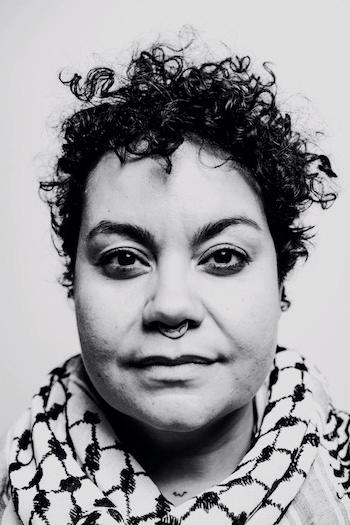
adrienne aree bro n
to reimagine how we hold ourselves, loved ones and our communities accountable with nurturing honest relationships. Brown is set to speak on Oct 23, Thursday at 12 p.m. to 1:30, location to be decided.

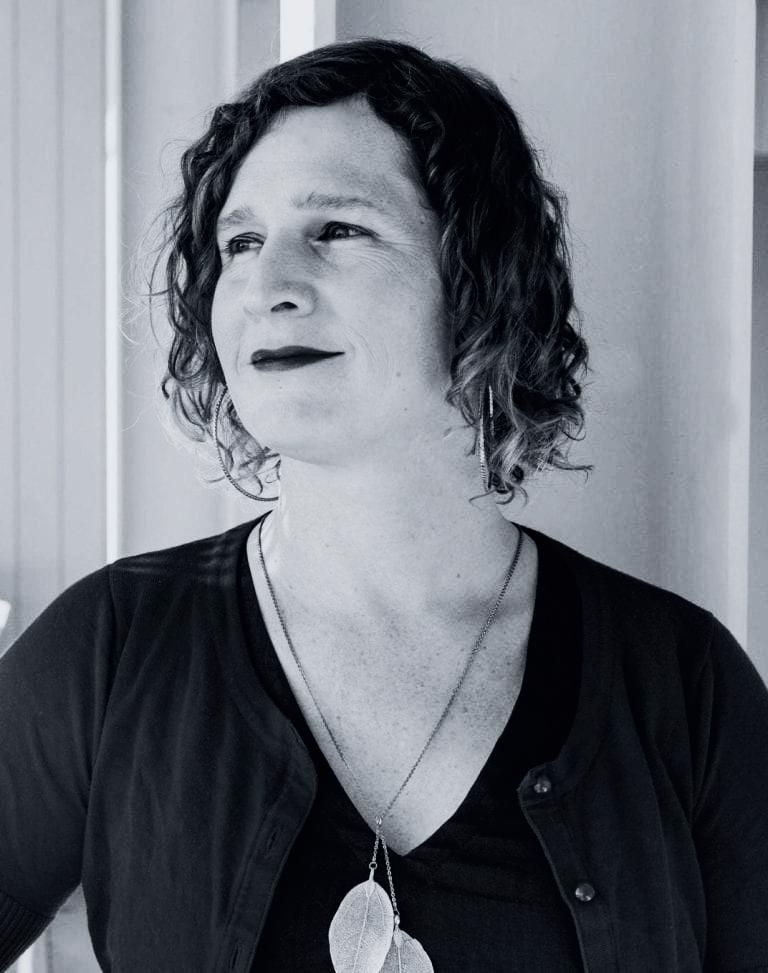
Times and locations for guest speakers and workshops will be available on the CDOR website: www.humboldt.edu/campusdialogue-on-race
la Comunidad sobre la Raza se llevará a cabo
para nuestras comunidades. Eleva los contra relatos, honrando la riqueza y complejidad de nuestras experiencias compartidas”, dijo Frank Herrera, coordinador del Centro de Justicia Social, Equidad e Inclusión. “Invitamos a toda nuestra comunidad a unirse en la construcción de entendimiento, en el desafío a las inequidades, y en la transformación de nuestro mundo hacia un lugar de equidad y pertenencia, donde todas las personas tengan la oportunidad de prosperar”.
El CDOR es un llamado a la acción y, al mismo tiempo, una invitación a la pausa, recordándonos que sanar y descansar son actos de resistencia. El diálogo reflexionará sobre apartarse y desconectarse de las tendencias y hábitos de sobreconsumo que influyen en nuestras decisiones. Si bien estos temas son cruciales y necesarios, se enfatiza
mucho en la reconexión como una forma de reivindicación, dando un paso atrás frente a la cultura del ajetreo y la culpa por descansar.
Micha Cárdenas, una colombianaestadounidense de primera generación, será una de las conferencistas invitadas al CDOR. Cárdenas es artista, autora y profesora de Estudios Críticos de Raza y Etnicidad en la Universidad de California, Santa Cruz. Su monografía académica Poetic Operations: Trans of Color Art in Digital Media fue coganadora del Premio Gloria Anzaldúa en 2022. Su uso de la tecnología digital está reimaginando el arte multicultural feminista y las nociones de identidad. Cárdenas dará su conferencia el 22 de octubre.
Adrienne Maree Brown es autora y
activista apasionada por profundizar en su proceso de sanación. Es parte de Black Organizing for Leadership and Dignity, en la intersección de la educación política, la organización comunitaria, la somática y el amor negro. Brown se enfocará en “cultivar un jardín de ideas sanadoras” que nos permita imaginar cómo nos acompañamos a nosotros mismos, a nuestros seres queridos y a nuestras comunidades con relaciones honestas y nutritivas. brown dará su conferencia el jueves 23 de octubre, de 12:00 p.m. a 1:30 p.m., en un lugar aún por determinar.
Los horarios y lugares de las conferencias y talleres estarán disponibles en el sitio web del CDOR: www.humboldt.edu/campusdialogue-on-race.
Dr. Robyn Magalit Rodriguez
dr. i a rdena
New coordinator hired for advising free speech demonstrations on campus
by Salvador Sandoval-Garduno
Cal Poly Humboldt students looking to table, organize a demonstration, or test the limits of sound amplification now have an advisor to guide them through campus Time,W Place and Manner (TPM) policy.
Heather Honig, the Interim Constructive Engagement Coordinator, assumed the newly created role this year, serving as the primary point of contact for all free speech activities on campus.
“The broad idea is that we are supporting free speech here on campus,” Honig said. “I work a lot with students. I work a lot with different departments on campus. I do have conversations with faculty, administrators, and it’s the idea that we want a space for free speech, but ensuring that we do it in a safe manner.”
The position was created after the California State University Chancellor’s Office adopted a standard systemwide TPM policy. The TPM was created as a requirement of the California State Budget Act of 2024. Each CSU has its own addendum to the systemwide TPM to address specifics to each campus.
At CPH, the TPM is meant to ensure that all tabling, demonstrations and protests are done safely, not interfering with classes.
El Leñador spoke to a few students regarding their opinions on the CSU’s systemwide TPM policy. Many students were concerned that the policy would stifle their free speech by dictating when and where they were allowed to hold demonstrations.
“If we can't assemble on campus to respond to things and to cause disruptions when we need to, then that is also an attack on free speech and assembly,” said Rock Toledo of Humboldt Students for a Democratic Society. “Because protest is not supposed
to be something that's approved.”
Chrissy Holliday, the Vice President of Enrollment Management and Student Success, noted that the current TPM is less restrictive than the previous policy.
“It used to be that you could only use amplified sound on the quad between noon and 1 p.m.,” Holliday said. “Now, that time frame isn't required, but what the measure is, is it disruptive.”
Both Honig and Holliday stated that the TPM does not regulate the content of free speech activity.
“It’s less about don’t do this,” Holliday said. “It’s more about, here’s how we need to do it, so we can all continue to live and work together in this space.”
Before taking on this new role, Honig worked as CPH’s Associate Dean of Students, where she oversaw both advising and discipline. In her new role, Honig no longer deals with discipline, instead she is a source of information for students seeking to express their freedom of speech.
“It didn’t seem very fair if, hey, let me give you support for your event, and by the way, you violated this, and now here’s your sanction,” Honig said.
This separation should assure students that they won’t be punished for seeking advice. Even if a student doesn’t follow the bureaucracy perfectly, they can still turn to Honig for assistance at any step of the process.
“I’d rather people just come to me and talk through what’s going on,” Honig said. “Because if it’s, ‘oops, I didn’t do it,’ it’s okay, let’s see what we can do.”
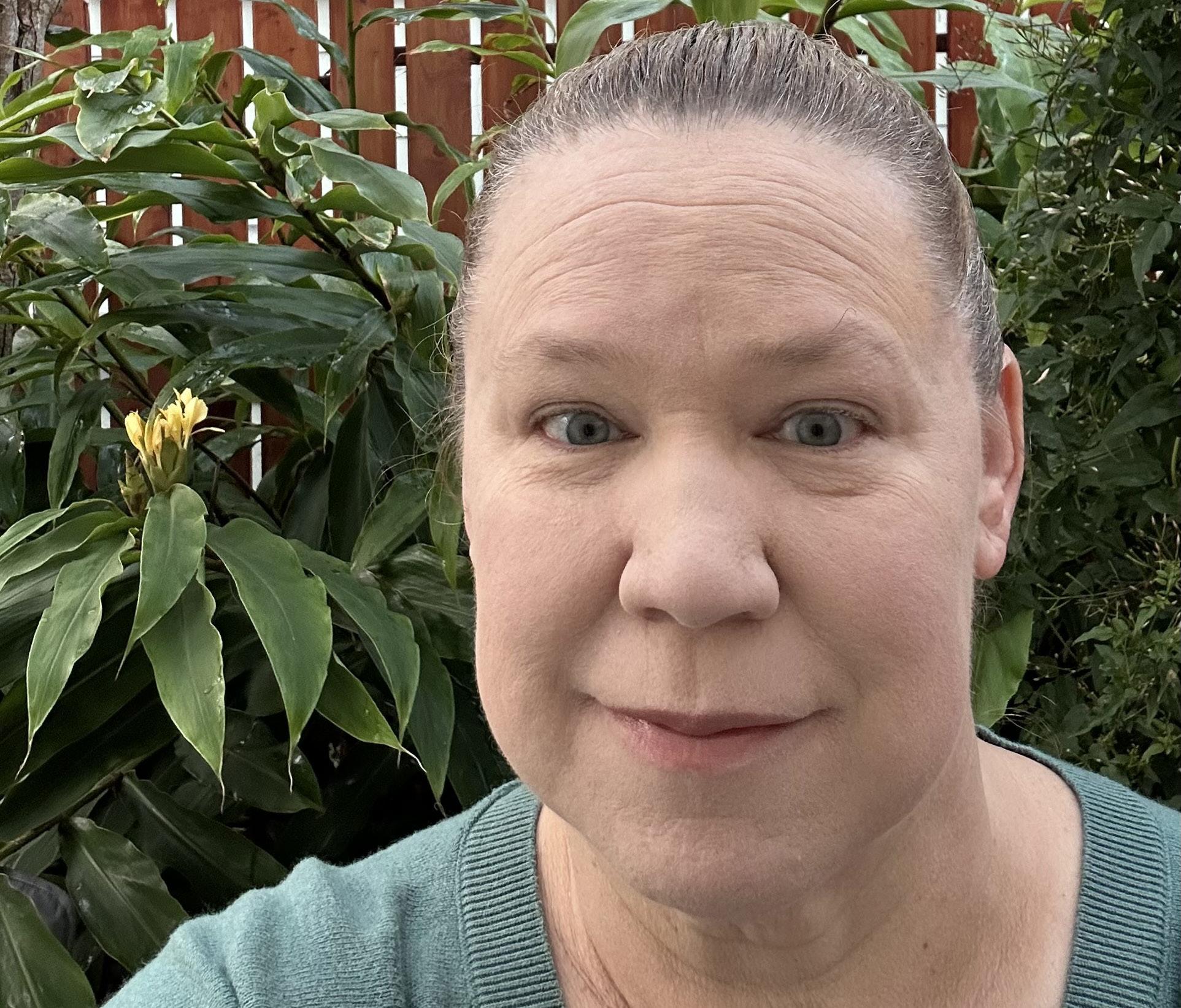
allowed under free speech. We have to make space for that.”
All events are meant to go through the Conference and Event Services (CES) website, where students can find the forms to request the space for their demonstrations. Honig and the CES team help students work out the logistics, ensure that amplified sound is not interfering with classes and that the demonstrations are abiding by fire regulations.
Unscheduled demonstrations, which are done without requesting the space prior, are protected by the TPM policy under certain circumstances.
“There is an allowance for spontaneous protests, which is supposed to arise because of something that has just happened,” Holliday said. “That is
In the instance of unscheduled demonstrations, Honig locates organizers and works with them to ensure that they are still able to practice their freedom of speech safely, without disrupting classes.
“I actually get to have these conversations with students and see what's on their mind, what's going on with them. And, how can we give you that voice here on campus,” Honig said.
Students interested in demonstrations, tabling or who want to learn more about the TPM can start with the Cal Poly Humboldt Free Speech website or by contacting Honig at hdb2@humboldt.edu.
Heather Honig, the Interim Constructive Engagement Coordinator. Photo courtesy of Cal Poly Humboldt Marketing and Communications
Life & Arts La Vida y Las Artes
Where milpas grow community fows
Local Latine cooperative Aquilli Metzli grows seed to table goods
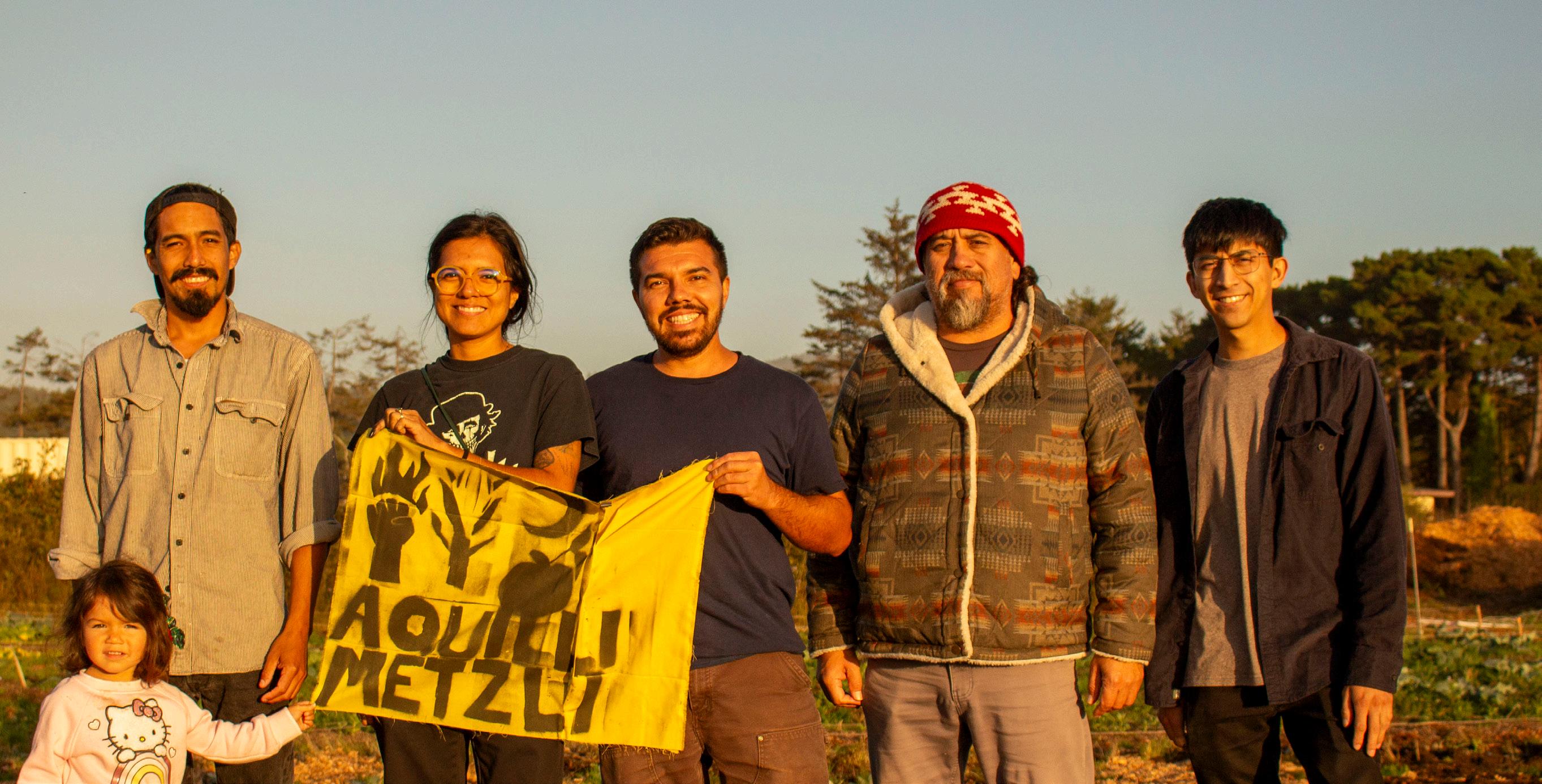
by Noelle Doblado
From seed to table, Humboldt’s local Latine and Indigenous cooperative is creating space to keep traditions and cultural farming practices alive. Aquilli Metzli volunteers get their hands dirty tending to plants in farm spaces located in Hoopa, Carlotta, personal at home gardens and the newly developed student farm.
Members are brought together by food that reminds them of who they are and those who came before them. They grow a variety of crops, but the root of their practice focuses on milpa, the Indigenous tradition of intergrowing corn, beans and squash. When planted together, these crops benefit each other, ultimately growing stronger together.
“There is something beautiful about saving seeds and genetics and using traditional knowledge to grow said plants and milpas,” said Aquilli Metzli member, Astrid Reusche. “It's a really cool way of planting plants that compliment each other and help each other grow.”
For Raul Pacheco, he always wished there was a space to connect to his ancestors in a meaningful way. When he stumbled upon a flyer about Aquilli Metzli, he knew that is exactly where he needed to be.
“I think it's important to explore your culture through maintaining our traditional
foods and making that connection with our relatives and our ancestors,” Pacheco said. “I think it's really beneficial to work together in this cooperative way, sharing ideas and sharing power as well.”
Aquilli Metzli hosts monthly gatherings for volunteers to come together for a meal prepped with the crops they have grown. Being new to the Humboldt community, member Leslie Ortega discovered the power of sharing a meal with those who understand you.
“It's also really cool to see how many people showed up in our first year of work parties, and just how many creative minds have come together where everyone's seeing the way its not just planting the seed, its also communally sharing meals, and things that make people feel less isolated,” Ortega said.
Adriana Salgado, member and part founder of Aquilli Metzli, has owned her small family farm, Wilder Natural Farm, in Humboldt for five years. In this space she has welcomed members to experiment with farming in a collaborative way.
“Farming is very isolating, so it's been really great to be able to create a space for young farmers and people who think food sovereignty is important to come together, we become friends,” Salgado said. “We went from strangers, in six months, to ride or dies.”
Salgado believes in the power that comes from being self reliant in this work and coming together to do so.
“In this day and age when companies aren’t providing for their workers, when governments aren’t providing for the people, the cooperative is an opportunity for us to provide for ourselves,” Salgado said.
As a long time farmer, Eric Gallegos feels that seeing his passion ignited in others has been the most rewarding part.
“Being able to do it with my friends now has been really fun and getting to have volunteer parties where people come out and learn all the things I have been doing to grow food, and to get to try some of the food that we have grown is really exciting and just really fills my heart with joy to be able to share that big part of my heart with the people I care about,” Gallegos said.
Aquilli Metzli began as a space for bonding. Now it has flourished into a community that is stronger because they found one another.
“Just seeing how happy people are when they're spending time outside moving their body, getting to know each other,” Gallegos said. “That’s what just makes me the most happy.”


Miembros de Aquilli Metzli, de izquierda a derecha: Octavio Leslie Ortega con maíz cultivado por Aquilli Metzli (arriba a
Aquilli Metzli members left to right: Octavio Acosta, Leslie grown by Aquilli Metzli (top right). Corn grown by Aquilli Metzli
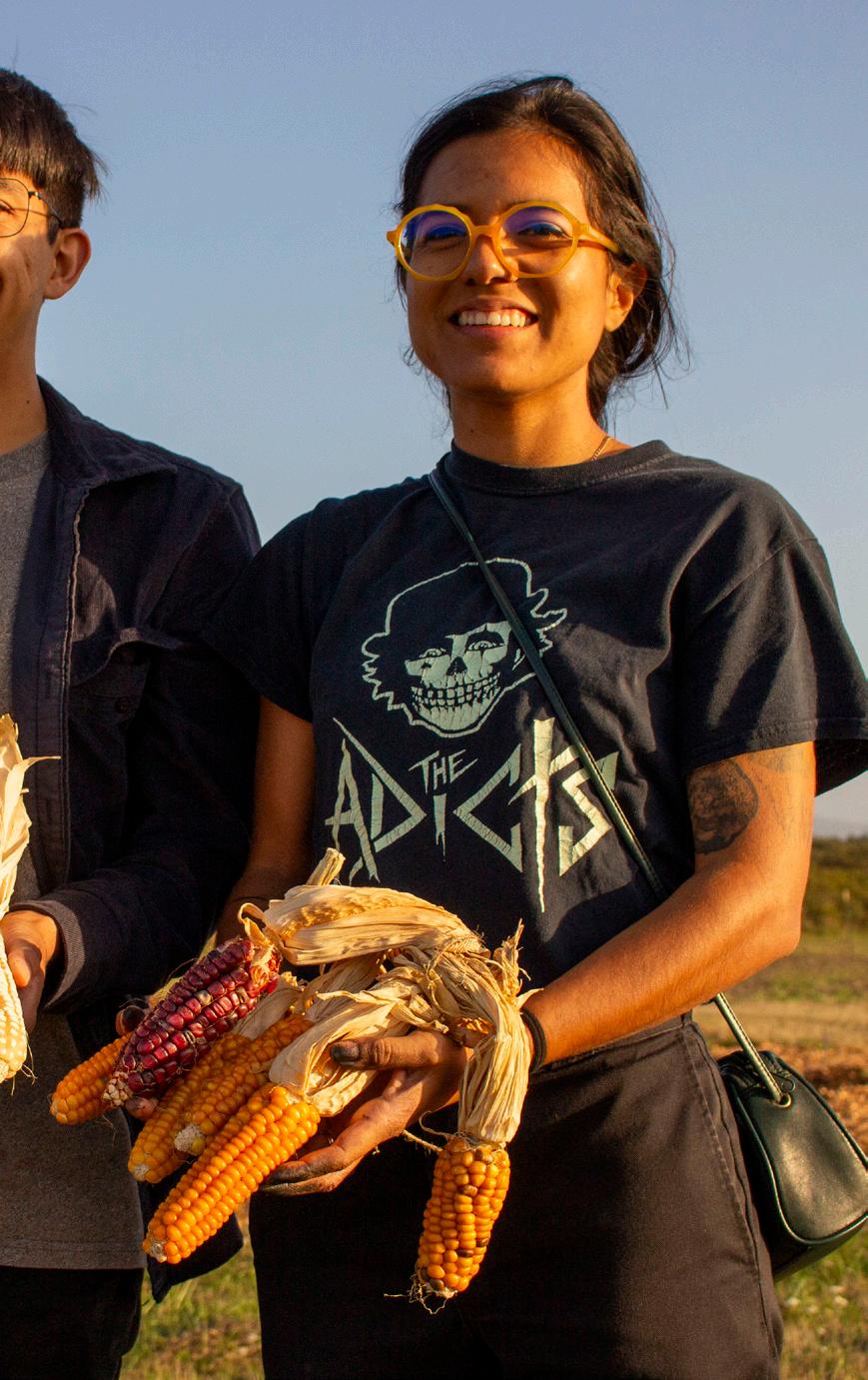
Donde crece la milpa, fuye la comunidad
La cooperativa local latine Aquilli Metzli cultiva alimentos de la semilla a la mesa
De la semilla a la mesa, la cooperativa local latine e indígena de Humboldt está creando un espacio para mantener vivas las tradiciones y las prácticas agrícolas culturales. Voluntarios de Aquilli Metzli se ensucian las manos cuidando plantas en terrenos de cultivo ubicados en Hoopa, Carlotta, huertos personales en casa y la recién desarrollada granja estudiantil.
Los miembros se unen a través de la comida que les recuerda quiénes son y quiénes vinieron antes que ellos. Cultivan una variedad de productos, pero la raíz de su práctica se centra en la milpa, la tradición indígena de sembrar maíz, frijol y calabaza. Al crecer juntos, estos cultivos se benefician mutuamente, fortaleciéndose en comunidad.

“Hay algo hermoso en guardar semillas y genética y en usar el conocimiento tradicional para cultivar esas plantas y milpas”, dijo Astrid Reusche, miembro de Aquilli Metzli. “Es una forma muy especial de plantar, donde las plantas se complementan y se ayudan entre sí a crecer.”
Para Raúl Pacheco, siempre existió el deseo de tener un espacio donde pudiera conectar con sus ancestros de una manera significativa. Cuando se topó con un volante sobre Aquilli Metzli, supo de inmediato que ese era su lugar.
“Creo que es importante explorar tu cultura manteniendo nuestros alimentos tradicionales y haciendo esa conexión con nuestros familiares y nuestros ancestros”, dijo Pacheco. “Pienso que es muy beneficioso trabajar juntos de esta manera cooperativa, compartiendo ideas y también compartiendo el poder.”
Aquilli Metzli organiza reuniones mensuales donde los voluntarios se encuentran alrededor de una comida preparada con los cultivos que han sembrado. Siendo nueva en la comunidad de Humboldt, Leslie Ortega descubrió el poder de compartir una comida con quienes te entienden.
“También es muy especial ver cuánta gente llegó en nuestro primer año de jornadas de trabajo, y cuántas mentes creativas se han reunido. Todos ven que no se trata solo de plantar la semilla, también de compartir comidas comunitarias y de crear cosas que hacen que la gente se sienta menos aislada”, dijo Ortega.
Adriana Salgado, miembro y cofundadora de Aquilli Metzli, ha tenido su pequeña granja familiar, Wilder Natural Farm, en Humboldt por cinco años. En este espacio ha invitado a los miembros a experimentar con la
agricultura de manera colaborativa.
“La agricultura es muy solitaria, así que ha sido increíble poder crear un espacio para jóvenes agricultores y para gente que cree en la soberanía alimentaria. Nos reunimos, nos hacemos amigos”, dijo Salgado. “Pasamos de ser extraños, en seis meses, a compañeros inseparables.”
Salgado cree en el poder que surge de la autosuficiencia y de unirse para lograrlo.
“En estos tiempos, cuando las empresas no proveen para los trabajadores, cuando los gobiernos no proveen para la gente, la cooperativa es una oportunidad de proveer para nosotros mismos”, dijo Salgado.
Para Eric Gallegos, agricultor con años de experiencia, lo más gratificante ha sido ver su pasión encenderse en otros.
“Poder hacerlo ahora con mis amigos ha sido muy divertido, y organizar jornadas de voluntariado donde la gente viene y aprende todo lo que he hecho para cultivar alimentos, y luego probar algo de lo que hemos cosechado, es realmente emocionante. Llena mi corazón de alegría poder compartir esa parte tan grande de mí con la gente que quiero”, dijo Gallegos. Aquilli Metzli comenzó como un espacio de encuentro. Ahora ha florecido en una comunidad que se ha hecho más fuerte porque se encontraron unos a otros.
“Ver lo felices que están cuando pasan tiempo al aire libre, moviendo su cuerpo, conociéndose entre sí,” dijo Gallegos. “Eso es lo que más me alegra.”
Escrito por Noelle Doblado y traducido por Maryanne Casas-Perez
Octavio Acosta, Leslie Ortega, Eric Gallegos, Raúl Pacheco, Gabriel Salazar (arriba a la izquierda). Raúl Pacheco y a la derecha). Maíz cultivado por Aquilli Metzli (abajo). Todas las fotos son de Noelle Doblado.
Ortega, Eric Gallegos, Raul Pacheco, Gabriel Salazar (top left). Raul Pacheco and Leslie Ortega with corn Metzli (bottom). All photos by Noelle Doblado.
Earth Drifter spices up Humboldt’s taste buds
by Andrea Merezko
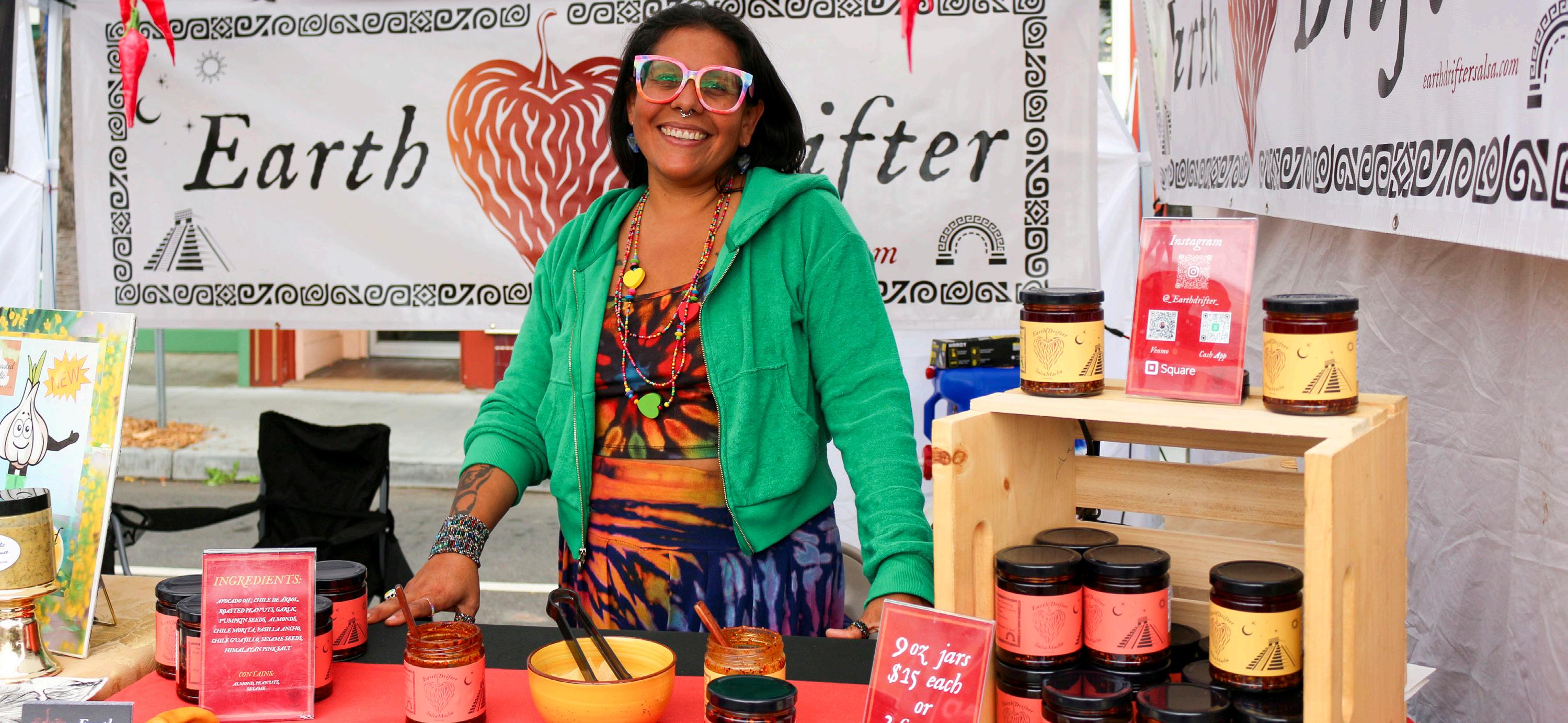
Humboldt County’s food scene is no stranger to creativity. Earth Drifter’s salsa macha, a Eureka-based brand founded by Nadia Eberman, brings this spirit to life by celebrating the rich cultural heritage of dried chiles and the history behind the ingredients.
Salsa macha is a Mexican chile oil from Veracruz, made with dried chiles, garlic, nuts and seeds in rich oil. For Eberman, salsa macha is not just another chile, it is a revelation. The first time she tried it, she questioned where it had been all her life. Introduced to the chile oil by a friend, she was immediately hooked. From there, the recipe entered her kitchen through someone even closer.
“My mom showed me the recipe. I love food, so I was really excited about it. I was having issues with work, and I was on disability,” Eberman said. “I wanted to figure out what I could do instead of working a nine to five. I was molding all these ideas and I was like ‘oh my gosh, I love salsa macha.’”
That passion quickly turned into action. Eberman’s first event selling her salsa at Organic Matters Ranch in Myrtle, Eureka, gave her a chance to share her creation with the community. Locals responded with immediate love and advice. Many suggested she create a spicier version, a challenge she gladly accepted. Both mild and spicy options are available on the shelves of Eureka Natural Foods in the Humboldt Made section, ready to give your next meal a kick.
The product’s identity extends beyond the jar. At Earth Drifter booths, customers are greeted by a bold logo that blends heritage with modern design. That design came together through an unexpected reunion. Alex Caldera, friend of Eberman, took on the execution of the branding and design. While the visuals are his craft, the ideas are all Eberman’s, infused with her essence and story.
“I was doing an event in Long Beach, and just spotted him, I haven’t seen him
in years honestly since he was in high school,” Eberman said. “I was telling him how I wanted to rebrand my things and he was all, ‘Let me help you.’ Which is awesome, he’s really been there for me.”
Locals' reactions of the fieriness ranged from immediate to delayed facial expressions, or none from the strong folks.
Eberman sells frequently at Farmers’ markets locally and at Humboldt Made events. With her appearance at the North Country Fair in Arcata, on Sept. 20-21, Humboldt resident Ilana Mahoe went for the mild option.
“It was really good, it was the perfect spiciness, I love the hint of peanut in it. I feel like other chile oils are very strong and just the chile flavor. This one has a lot of flavor profiles,” Mahoe said.
Her partner Mathew Villava went for the spiciest from the get-go.
“It was good, the flavor was delayed, and it was there. And when it came in late it was really strong. It hit for sure,” Villava said.
Elijah Marshall, Humboldt local, felt similar excitement.
“It seemed like it wasn't going to hit, then it hit the back of my tongue. I feel like if I actually absorbed it into my throat the moment I would start coughing, like really bad, only certain people could take it. I got melanin, I can handle it,” Marshall said.
Surprising layers of flavor tie directly into Earth Drifter, a brand built on boldness and movement. The name came from the joy received from traveling, but not necessarily feeling grounded anywhere. It's more than just salsa macha to Eberman. Being multi-racial, with Indigenous and Mexican roots, there's a deep connection to crafting this chile.
“I feel like it’s not just my business too, it's a story about my life,” Eberman said. “And I feel like when I make that chile I'm putting it in there, like my love, everything.”
Nadia Eberman Owner of 'Earth Drifter' at her booth selling her chile at the North Country Fair on Sept. 20. Photo by Andrea Merezko
Earth Drifter enchila al paladar de Humboldt
La movida gastronómica del condado de Humboldt está llena de creatividad. Un claro ejemplo es Earth Drifter, la marca de salsa creada en Eureka por Nadia Eberman, que honra el legado cultural del chile seco y la historia detrás sus ingredientes.
La salsa macha, originaria de Veracruz, se elabora con chiles secos, ajo, semillas y nueces en aceite. Para Eberman, no es cualquier chilito, sino una verdadera revelación. La primera vez que la probó se preguntó dónde había estado todo ese tiempo. Fue gracias a una amiga que la conoció, y desde ese momento se flechó al instante. A partir de ahí, la receta llegó a su cocina de la mano de alguien aún más cercano, su mamá.
“Mi mama me enseño la receta. Siempre me ha encantado la comida, así que me emocione muchísimo. En ese momento estaba teniendo problemas con el trabajo y estaba con incapacidad,” dijo Eberman. “Quería encontrar algo distinto a la chamba típica de lunes a viernes. Tenía un montón de ideas rodando y de pronto dije, !me encanta la salsa macha!”
La pasión se convirtió rápidamente en acción. Su primer evento vendiendo salsa fue en Organic Matters Ranch, en Myrtle, Eureka, donde pudo compartir su creación con la comunidad. La reacción no se hizo esperar, a la gente le encantó, y además le recomendaron hacer una versión más brava, y ella se lanzó con todo al reto. Ahora puedes encontrar la versión medio picante y la brava en Eureka Natural Foods, dentro de Humboldt Made, perfectas para acompañar cualquier platillo.”
Sin embargo, la esencia del producto no se limita al frasco. En los puestos de Earth Drifter destaca un logo fuerte, que mezcla herencia y diseño moderno. El diseño y la identidad visual de la marca salieron de un reencuentro inesperado con Alex Caldera, quien se encargó de ejecutarlo. Aunque los aspectos visuales son obra de él, todas las ideas son de
Eberman, con todo su toque y su historia detrás.
“Estaba en un evento en Long Beach y de repente lo vi. Tenía años sin verlo, desde la prepa,” dijo Eberman. “Le platiqué que quería relanzar mi marca y me dijo, ‘Déjame ayudarte.’ Fue increíble, me ha apoyado muchísimo”
Al probar la salsa, la gente reacciona de distintas maneras. Unos ponen caras de enseguida, otros sienten el golpe de sabor después, y los más valientes lo aguantan sin problema. Eberman participa constantemente en mercados locales y eventos de Humboldt Made. En su paso por la North County Fair en Arcata el 20 y 21 de septiembre, Ilana Mahoe se animó con la versión tranquila.
“Está riquísima, el nivel de picante es perfecto. Me encanto ese toque de cacahuate. Siento que otras salsas machas solo saben a chile y ya asi, pero esta tiene un montón de sabores que se mezclan muy bien,” comentó.
Su pareja, Matthew Villava, se animó con la más brava desde el principio. “ Estaba buena, el sabor tarda en llegar, pero cuando pega, pega con todo. Si te prende,” dijo Villava.
Otro local, Elijah Marshall, también la describió con emoción. “Al principio parece que no pica, pero después sientes como se enciende de atrás de la lengua. Si la tragas bien de golpe seguro empiezas a toser. No cualquiera aguanta esto, yo tengo color, yo si le entro.”
Esas capas de sabor inesperadas son parte de lo que significa Earth Drifter, una marca construida sobre la fuerza y movimiento. El nombre nació de la alegría de viajar, aunque sin sentirse pegado en el mismo lugar. Y es que para Eberman, la salsa macha es más que un negocio: es un reflejo de su propia historia.
“Yo siento que no es solo mi proyecto, también es la historia de mi vida," afirma. “Cada vez que preparo la salsa, pongo ahí todo, mi amor, mi energía, mi esencia.”


Escrito por Andrea Merezko y traducido por Osvaldo Bustos Perez
Earth drifter's salsa macha en su stand con la opción "picante". Fotos por Andrea Merezko
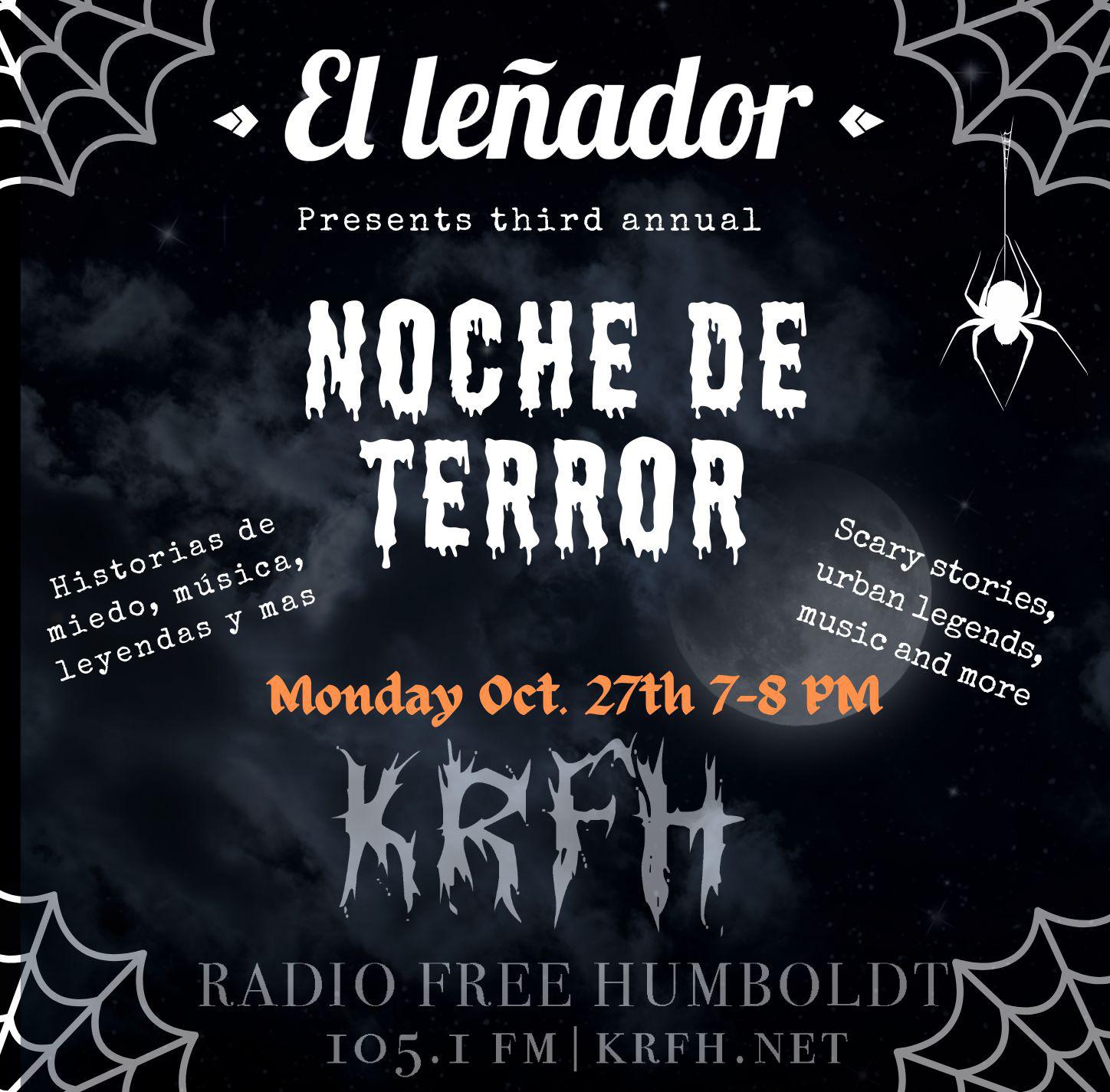



(707)443-5021
otoño 2025 2 de SEPTIEMBRE11 de DICIEMBRE
englishexpressempowered.com
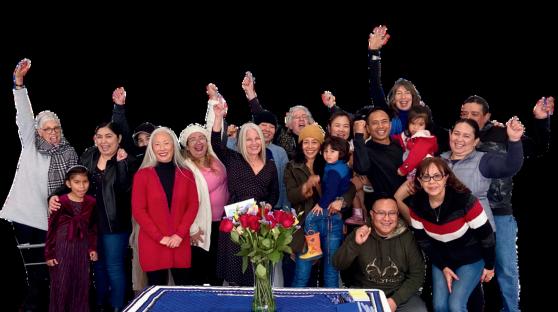

Los martes y jueves

Zoom ID 707-443-5021
Contraseña 464816
CLASES DE CIUDADANÍA EN PERSONA
Preparación para el examen de naturalización
EUREKA
Los lunes 6:00 - 7:30 pm
Centro comunitario de Jefferson Sala 2, 1000 B Street
FORTUNA
Los jueves 6:00 - 7:00 pm
Iglesia Episcopal St. Francis Ferguson House, 568 16 Street th







EUREKA
Los miércoles 6:00 - 7:15 pm
Centro comunitario de Jefferson Sala 2, 1000 B Street
FORTUNA
Los jueves 11:00 am - 12:00 pm
St. Francis Episcopal Church Salón Comunitario 568 16 Street th
RIO DELL
Los sábados 11:30 am - 12:30 pm
Centro de recursos comunitarios de Rio Dell , 406 Wildwood Drive







by Julia Rants
Community Tardeada, organized by El Centro Académico Cultural de Humboldt and Equity Arcata, will take place Friday, Oct. 3, at 6 p.m. at the D Street Community Center in Arcata. The celebration is a part of other Hispanic Heritage Month events to make space for connection, joy and dialogue between Cal Poly Humboldt and the Humboldt community.
“The word tardeada refers to an evening gathering centered on community, and that’s exactly the spirit of this event,” said El Centro coordinator Brenda Pérez. “It’s a convivio, a time to come together across campus and community, share culture and celebrate identity.”
The event will open its doors at 6 p.m. with dinner being served around 6:30 p.m. by local vendors including
Celebra el Mes de la Herencia Hispana con la Comunidad Tardeada Celebrate Hispanic Heritage Month with Community Tardeada
La Community Tardeada, organizada por el Centro Académico Cultural de Humboldt y Equity Arcata, arranca el viernes 3 de octubre a las 6 p.m. en el Centro Comunitario de la Calle D en Arcata. La celebración forma parte de otros eventos del mes de la Herencia Hispana que buscan crear un espacio para la conexión, la alegría y el diálogo entre Cal Poly Humboldt y la comunidad de Humboldt.
“La palabra tardeada se refiere a una reunión vespertina centrada en la comunidad, y ese es exactamente el espíritu de este evento,” dijo la coordinadora del Centro, Brenda Perez. “Es un convivio, un momento para reunirnos entre campus y comunidad, compartir cultura y celebrar la identidad.”
El evento abrirá sus puertas a las 6 p.m. y la cena será servida alrededor de las 6:30
Los Giles Taqueria and Pupusería San Miguel.
Alongside dinner, Latine local businesses and serving initiatives spanning across sectors, including nonprofit, advocacy, education and health will be tabling.
Fernando Paz, campus and community development coordinator and Equity Arcata co-manager, highlights the importance of last year’s Tardeada in bringing people together, sharing his vision for this year’s event.
“For the first time, maybe in history, I don’t know if it had ever happened in Humboldt before, but we were able to convene all the Latino organizations in the county,” Paz said. “And we did it last year, and we wanted to do it again this year, and maybe have it be more connected to the university so all the
campus community gets to meet the at large community folks that identify as Latino.”
The wide participation of Latine-led organizations and businesses reflects the purpose of the tardeada, to bring together diverse groups committed to supporting Latine communities in Humboldt County.
“The goal is to build bridges between on-campus and off-campus communities in a time when unity and mutual understanding are deeply needed,” said Pérez. “Alongside music, food and dance, the event is also a platform for important conversations about heritage, identity, and belonging.”
*Disclosure: El Leñador will be tabling at this event.



p.m. por vendedores locales como Los Giles Taqueria y Pupuseria San Miguel.
Junto con la cena, habrá mesas informativas de negocios locales y de iniciativas que trabajan en sectores distintos, incluyendo organizaciones sin fines de lucro, comunitaria, educación y salud.
Fernando Paz, coordinador de desarrollo comunitario y del campus, y co-gerente de Equity Arcata, resaltó la importancia de la Tardeada del año pasado al reunir a la gente, compartiendo su visión para este año.
“Por primera vez, quizá en la historia, no sé si alguna vez había pasado en Humboldt antes, logramos convocar a todas las organizaciones latinas del condado,” dijo Paz. “Y lo hicimos el año pasado, y quisimos repetirlo este año, pero más conectado con la universidad, para que toda la
comunidad del campus conozca a la comunidad identificada como latina.”
La amplia participación de organizaciones y negocios liderados por personas latine refleja el propósito de la tardeada, reunir a diversos grupos comprometidos con el apoyo a las comunidades latine en el condado de Humboldt.
“Lo que se busca es crear más conexión entre las comunidades dentro y fuera del campus en un momento en que la unidad y la compasión mutua son profundamente necesarias", dijo Perez. “Junto con la música, la comida y el baile, el evento es un espacio para conversaciones importantes sobre herencia, identidad y sentido de pertenencia.”
*Divulgación: El Leñador estará presentando en este puesto.
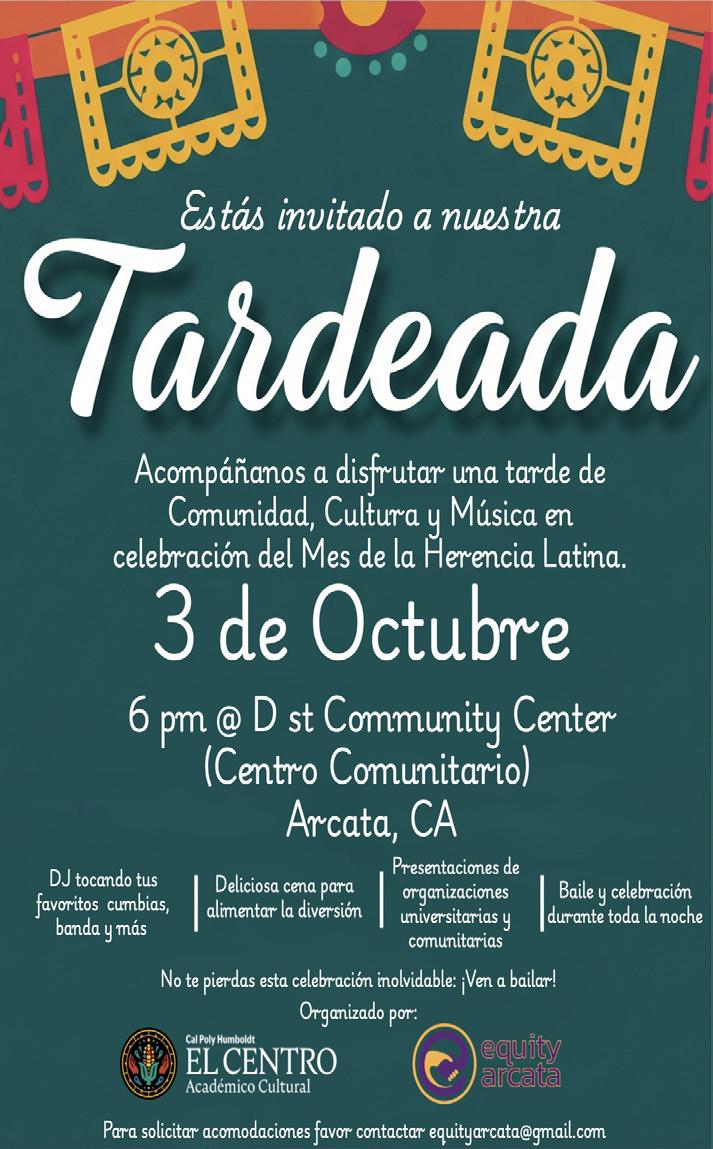
Diulgacíon: El Leñador estará presentando en este puesto.
Flyer courtesy of El Centro Académico Cultural de Humboldt and Equity Arcata
Escrito por Julia Rants y traducido por Osvaldo Bustos Perez
Opinion: Were you silent or silenced?
by Jordan Pangelinan
The Corporation for Public Broadcasting funding was cut in July of 2025 and it seems like it wasn’t a big deal right? Maybe you haven’t seen major hits yet so it’s not obvious. CPB, according to cpb. org, “is a private, non-profit corporation authorized by Congress in the Public Broadcasting Act of 1967. CPB is the steward of the federal government’s investment in public broadcasting and the largest single source of funding for public radio, television, and related online mobile services.”
It is incredibly scary to receive such news as a journalist who is about to graduate in December and unsure of what jobs might be available, wondering if the last four years meant nothing. To find a job in this time period where the president thinks my job is a joke or whatever B.S. comes out of his mouth is so frustrating. Right now we are seeing public media take the hits from funding cuts and it just brings me back to high school history.
Where are all the history buffs?

Isn’t this something we’ve seen in the rise of dictatorships? In my own experience with male relationships, most tend to praise their knowledge on U.S. history, but where is this uproar of your First Amendment being violated? Maybe because they liked the power the oppressor had and it gave them a sense of manliness. Oh, and can’t forget, without the Second Amendment the world would be over.
I am going to bring up Charlie Kirk. To give your favorite podcaster the presidential freedom award is BONKERS! To say he died for free speech makes me scratch my head. His rhetoric was not only outlandish but hateful. “If I see a Black pilot, I’m going to be like, boy, I hope he’s qualified.” or “I think it’s worth it to have a cost of, unfortunately, some gun deaths every single year so that we can have the Second Amendment to
protect our other God-given rights. That is a prudent deal. It is rational.” These quotes are from Kirk himself. Both Kirk and Trump have not served for this country, whatever that means. There are journalists in Gaza being martyred for covering on the ground news, and what do they get? A “they deserve this because Hamas.” Do you hear yourself? Journalists are being fired for speaking up on a genocide? “Free speech,” alright.
Opinión: ¿Estuviste en silencio o te silenciaron?
Escito por Jordan Pangelinan y traducido por Maryanne Casas-Perez
La financiación para la Corporación de Radiodifusión Pública (CPB) fue recortada en julio de 2025 y, al parecer, no fue gran cosa, ¿verdad? Tal vez todavía no has visto impactos mayores, así que no es tan obvio. Según cpb.org, la CPB “es una corporación privada y sin fines de lucro autorizada por el Congreso en la Ley de Radiodifusión Pública de 1967. La CPB es la administradora de la inversión del gobierno federal en la radiodifusión pública y la mayor fuente única de financiamiento para la radio, la televisión y los servicios móviles y en línea relacionados”.
Es increíblemente aterrador recibir una noticia así siendo periodista a punto de graduarse en diciembre, sin saber qué trabajos estarán disponibles, preguntándome si estos últimos cuatro
años no significaron nada. Buscar trabajo en esta época, donde el presidente piensa que mi profesión es una broma o lo que sea que salga de su boca, es frustrante. Ahora mismo estamos viendo cómo los medios públicos reciben los golpes de los recortes de fondos y esto solo me hace recordar mis clases de historia en la secundaria.
¿Dónde están todos los aficionados a la historia? ¿No es esto algo que hemos visto en el surgimiento de dictaduras? En mi propia experiencia con las relaciones con hombres, la mayoría tiende a presumir su conocimiento de la historia de los Estados Unidos, pero ¿dónde está su indignación por la violación de la Primera Enmienda? Quizá porque les gustaba el poder que tenía el opresor y eso les daba un sentido de hombría. Ah,
y no se puede olvidar: sin la Segunda Enmienda, el mundo se acabaría.
Voy a mencionar a Charlie Kirk.
¡Darle a tu podcaster favorito la Medalla Presidencial de la Libertad es UNA LOCURA! Decir que murió por la libertad de expresión me hace rascarme la cabeza. Su retórica no sólo era extravagante, sino también llena de odio. “Si veo a un piloto negro, voy a decir: chico, espero que esté calificado.”
o “Creo que vale la pena tener el costo de, lamentablemente, algunas muertes por armas de fuego cada año para poder tener la Segunda Enmienda y proteger nuestros otros derechos dados por Dios. Ese es un trato prudente. Es racional.”
Estas son citas de Kirk mismo.
Ni Kirk ni Trump han servido a este país, sea lo que sea que eso signifique. Hay
We deserve public media where we can criticize the administration, and yes even if that means 97% of the article makes them look bad. MAN IF THE SHOE FITS.
This is an everyone issue, not just a Black, Brown, Native, woman, man issue. It's EVERYONE'S ISSUE! I’m tired of living in an environment where only right-wing speech is acceptable and the “truth.” Big brother is always watching, but he is never your friend.
periodistas en Gaza siendo martirizados por cubrir noticias sobre el terreno, ¿y qué reciben? Un “se lo merecen porque Hamás”. ¿Te oyes a ti mismo? ¿Despedir a periodistas por hablar de un genocidio? “Libertad de expresión”, claro. Merecemos medios públicos donde podamos criticar a la administración, ¡sí, incluso si eso significa que el 97% del artículo los deje mal parados! SI EL ZAPATO TE QUEDA, ÚSALO. Este es un problema de todos, no solo de personas afroamericanas, morenas, indígenas, mujeres y hombres. ¡ES UN PROBLEMA DE TODOS! Estoy cansada de vivir en un entorno donde solo se acepta el discurso de derecha y la “verdad”. El Gran Hermano siempre está mirando, pero nunca es tu amigo.
Graphic by Jordan Pangelinan Grafíca por Jordan Pangelinan


Arrendamientos de Negocios



¡Su equipo de confianza en bienes raíces sirviendo a la comunidad hispana de Humboldt por más de 20 años!
Llámanos hoy para una consulta gratuita y personalizada Visítanos en # 637 F Street, Arcata Compra y venta de: Casas, Terrenos, Apartamentos, Propiedades Comerciales y Negocios


@NorCal Casas

Your Zodiac Perfect Halloween
by Pamela Hernandez
Aquarius:
Enid from "Ghost World"
Are you a deep thinker, scared of growing up and what the future may hold? So does Enid. She's a snarky cynical teenager from the flm “Ghost World”. She has many iconic looks so this niche costume will have you looking cool and mysteri ous while simultaneously reminding you of your awkward growing pains.
Pisces:
Ludovico P. Luche from "La familia P. Luche"
This one is for the pisces who grew up watching Univision. “La familia P. Luche” always caught my attention due to them being decked out in their chaotic fur outfts. For the clumsy, funny, and let's admit oftentimes gullible pisces, this Halloween the perfect costume for you is Ludovico P. Luche. Replicate this sensitive diva by dressing in your best fur coat and eccentric tie!!!

Taurus:
Carmy from "The Bear"
Known for your passion, drive and strong work ethic, what's more creative than dressing up as Carmy?
Throughout the show we see how Carmy struggles with his stubborn ness, constantly trying to be the glue and juggle various things at once. So this Halloween, Tauruses chill, take a break, but just don't forget your iconic “yes chef.”
Gemini:
“Gemini Rights” by Steve Lacy

Aries:
Applejack from "My Little Pony"
You are known for your bravery, lead ership and dependability. What better costume than AppleJack from “My Little Pony”? Perfect time to dust of your boots, rock a cowboy hat and live out your horsegirl, "Brokeback Mountain" fantasy. Better yet, make this a group costume because what's more magical than friendship?


Since “you can't surprise a Gem ini” how about a costume named after you! Geminis this Halloween you need to take advantage of this play on words and dress us as Steve Lacy’s album cover “Gemini Rights.” The duality of genres in this album embodies the stereotypical “twofaced” trait, while simultaneously demonstrating that it’s not always a bad thing. This costume will be a great conversation starter for the talkative and curious geminis. Just make sure not to bite your tongue, because it’s your…Bad Habit!

“500 Days of Summer”
Known for wearing their heart on their sleeve and not being afraid to cry, there’s cancer, our profes sional zodiac yearners and lovers. The perfect costume for you is Tom from “500 Days of Summer”, our OG preformative sensitive male… and let’s be real you probably are a lover of The Smiths or have a couple songs mixed into your playlist. All you need is a basic white T, slap a cardigan on top, and rock your Porta Pro headphones. To be brutally honest, most of you are probably rocking this ft right now.

Leo:
Minion
Known for being loyal and usually associated with the color yellow, what's more ftting for a Leo than being a minion. Your friend wants to steal the moon? I know you’ll be buckling your overall straps and fying out the door. Knowing Humboldt, I’m positive you or someone you know owns a pair of overalls. This easy-to-pull-of costume will have you plotting all night getting ready for the diferent shenanigans you may encounter while staying comfy and practical. BONUS+ points if your name is Bob or Kevin.

Scorpio:
Shauna from "Yellowjackets” Scorpio, our new redwood antler queen. You're secretive, passionate and resourceful… but hopefully not resourceful enough to engage in cannibalism this Halloween. There are many ways of rocking this ft, whether it be in a soccer outft, plaid fannel, or some cool pair of antlers and twigs from your backyard. Just don't get on a plane anytime soon.
Libra:
Megan from “But I’m a Cheerleader”
The dreamer, social butterfy and cheerleader of the friend group. The perfect costume is Megan from “But I’m a Cheerleader”. You value your freedom and are some times a bit rebellious. Like Megan, you can do it all, defy tradition, and live as your authentic self.
Virgo:
Tashi from "Challengers" Known for your hard work and ded ication, you're down to earth, and sometimes work too hard on being a perfectionist… if that's the case, Tashi from “Challengers” may be the costume for you. Be prepared to swing your racket and show of your form. If you start practicing now, your backswing might compare to Tashi's, but let’s also be real, it probably won’t.

Sagittarius:
Finn from "Adventure Time"

You are probably always begging your friends to frolic in the forest with you. You love the redwoods and going on adventures. What better costume than Finn from “Adventure Time”? Like Finn, you're probably friendly and magnetic.

Capricorn:
President Snow from "The Hunger
With the new movie coming out, and us inching closer to a dystopian future, what better costume than President Snow. Let's be honest you're probably dictating Hallow een night, making plans, organizing where and when everyone should meet. Let’s just hope you're using that ambition and determination for good.. If this made you mad, con grats Capricorns, you’ve just proved my point.


Beyond the bedroom: breaking the silence on sex therapy
Health Talk With Jessica
by Jessica de Laguna
Behind closed doors, we whisper about orgasms, masturbation, boundaries, and shame, unsure of where to turn. Sex therapy offers a radical yet simple solution: a safe space to talk.
Dr. Laurie Mintz, AASECT-certified sex therapist, emeritus professor of psychology at the University of Florida, explained what sex therapy involves.
"There's a myth that sex therapy is fundamentally different from regular therapy, but it's really just a specialty within therapy," Mintz said. "An even worse misconception is that your therapist will have sex with you or watch you have sex. That's obviously unethical, but some people still believe it."
Mintz highlights the crucial link between sexual satisfaction and overall mental well-being.
"People who are happy in their sex life are generally happier overall," Mintz said. "When sex is going well, it often doesn’t occupy much of our mental space. But research shows that when sex isn’t going well, it becomes troubling and negatively impacts people's lives. Sex therapy can help not only with sexual issues but also with overall well-being and relationship satisfaction."
Cassandra E. Rustvold, an AASECTcertified sex therapist and Somatic Experiencing Practitioner in Humboldt County, describes who might benefit from sex therapy.
“Sex therapy benefits people exploring orientation or gender identity, those with desire or trauma challenges, and couples navigating infidelity or polyamory,” Rustvold said. “Sexuality is broader than acts — it’s about how we experience and express ourselves.”
Rustvold explained how sex therapy helps students address complex sexual issues and explore their boundaries in a

supportive, non-judgmental environment.
“Working with someone trained in sex therapy can help students form unique sexual boundaries and desires while navigating the taboo and misunderstood nature of sex,” Rustvold said.
With her belief that human sexuality is a vital topic, Rustvold is bringing this perspective into the classroom. Next spring, she will teach a Human Sexuality course at College of the Redwoods and plans to offer similar classes at Cal Poly Humboldt in the near future.
CPH senior and aspiring sex
therapist, Stephanie Murillo, is bringing the conversation directly to students. As a Critical Race, Gender and Sexuality Studies major, Murillo said she is driven to create spaces where people can claim their own bodies.
“Pleasure is a human right and we all deserve to allow joy into our lives without the fear of judgment or shame,” Murillo said.
During her summer research in Guanajuato, Mexico, Murillo conducted sexual health research interviewing women under the guidance of Professor Monica Elivier Sánchez González at the Universidad de Guanajuato.
“I found that sexual education is often replaced by overmedication, sometimes to prevent pregnancy after sexual violence,” Murillo said. “Many women lacked the language to describe their pain, and decisions about their bodies were made by others.”
Murillo added that the experience “lit a fire” under her to pursue sex therapy and education on campus as a way to fight structural violence and empower students to advocate for their own pleasure and sexual health.
“This is a sex-positive campus,” Murillo said. “A sex therapist could help students navigate sexual health concerns linked to medication, discuss identity and boundaries and heal from trauma.”
Building on the importance of addressing sexual health, Mintz emphasized the need for specialized support on college campuses.
“I believe college counseling centers should employ therapists who are comfortable, skilled and experienced in treating sexual issues,” Mintz said.
Needing sex therapy shouldn’t be a secret — take the conversation outside the bedroom, break the silence, and start the discussion that’s been waiting too long to happen.
“Pleasure is resistance,”Murillo said. “Helping people reclaim it dismantles systems of oppression.”
Rustvold’s practice is at capacity but reserves pro bono and sliding-scale spots for BIPOC and LGBTQ+ clients. Details at www.CassandraRustvold.com.
Mintz advises students to seek sexual health information from trusted sources, warning against misinformation on social media. For reliable guidance, follow her on Instagram @DrLaurieMintz.
Graphic by Jessica de Laguna
Más allá del dormitorio: rompiendo el silencio
Health Talk With Jessica
Escrito por Jessica de Laguna y traducido por Laura Sanchez
A puerta cerrada, susurramos sobre orgasmos, masturbación, límites y vergüenza, sin estar seguros de a dónde acudir. La terapia sexual ofrece una solución radical pero simple: un espacio seguro para hablar.
La Dra. Laurie Mintz, terapeuta sexual certificada por AASECT y profesora emérita de psicología en la Universidad de Florida, explicó en qué consiste la terapia sexual.
“Existe el mito de que la terapia sexual es fundamentalmente diferente de la terapia regular, pero en realidad es solo una especialidad dentro de la terapia”, dijo Mintz. “Un concepto aún peor es la idea de que tu terapeuta tendrá sexo contigo o te observará teniendo sexo. Eso es obviamente antiético, pero algunas personas todavía lo creen”.
Mintz destaca el vínculo crucial entre la satisfacción sexual y el bienestar mental en general.
“Las personas que son felices en su vida sexual generalmente son más felices en general”, dijo Mintz. “Cuando el sexo va bien, a menudo no ocupa mucho espacio en nuestra mente. Pero las investigaciones muestran que cuando el sexo no va bien, se vuelve problemático y afecta negativamente la vida de las personas. La terapia sexual puede ayudar no solo con los problemas sexuales, sino también con el bienestar general y la satisfacción en las relaciones”.
Cassandra E. Rustvold, terapeuta sexual certificada por AASECT y practicante de Experiencia Somática en el condado de Humboldt, describe quién podría beneficiarse de la terapia sexual.
“La terapia sexual beneficia a personas que exploran su orientación o identidad de género, aquellas con desafíos relacionados con el deseo o el trauma, y a parejas que navegan la
infidelidad o el poliamor”, dijo Rustvold. “La sexualidad es más amplia que los actos: se trata de cómo experimentamos y nos expresamos”.
Rustvold explicó cómo la terapia sexual ayuda a los estudiantes a abordar cuestiones sexuales complejas y explorar sus límites en un entorno de apoyo y sin juicios.
“Trabajar con alguien capacitado en terapia sexual puede ayudar a los estudiantes a formar límites y deseos sexuales únicos mientras navegan por lo tabú y lo malentendido que es el sexo”, dijo Rustvold.
Con su convicción de que la sexualidad humana es un tema vital, Rustvold está llevando esta perspectiva al aula. La próxima primavera, enseñará un curso de Sexualidad Humana en el College of the Redwoods y planea ofrecer clases similares en Cal Poly Humboldt en un futuro cercano.
Stephanie Murillo, estudiante de último año en CPH y aspirante terapeuta sexual, está llevando la conversación directamente al estudiantado. Como estudiante de Raza Crítica, Género y Estudios de Sexualidad, Murillo dijo que está motivada a crear espacios donde las personas puedan reclamar sus propios cuerpos.
“El placer es un derecho humano y todos merecemos permitir que la alegría entre en nuestras vidas sin miedo al juicio o a la vergüenza”, dijo Murillo.
Durante su investigación de verano en Guanajuato, México, Murillo realizó investigaciones sobre salud sexual entrevistando a mujeres bajo la guía de la profesora Mónica Elivier Sánchez González en la Universidad de Guanajuato.
“Descubrí que la educación sexual a menudo es reemplazada por la sobremedicación, a veces para prevenir embarazos después de violencia sexual”,

dijo Murillo. “Muchas mujeres carecían del lenguaje para describir su dolor, y las decisiones sobre sus cuerpos eran tomadas por otros”.
Murillo agregó que la experiencia “encendió un fuego” en ella para dedicarse a la terapia sexual y la educación en el campus como una forma de luchar contra la violencia estructural y empoderar a los estudiantes para que defiendan su propio placer y salud sexual.
“Este es un campus de sexo positivo”, dijo Murillo. “Un terapeuta sexual podría ayudar a los estudiantes a navegar preocupaciones de salud sexual relacionadas con medicamentos, discutir identidad y límites, y sanar traumas”.
Basándose en la importancia de abordar la salud sexual, Mintz enfatizó la necesidad de apoyo especializado en los campus universitarios.
“Creo que los centros de consejería universitaria deberían emplear terapeutas que se sientan cómodos, sean hábiles y tengan experiencia en el tratamiento de
problemas sexuales”, dijo Mintz.
Necesitar terapia sexual no debería ser un secreto: lleva la conversación más allá del dormitorio, rompe el silencio y comienza la discusión que ha esperado demasiado tiempo.
“El placer es resistencia”, dijo Murillo. “Ayudar a las personas a reclamarlo desmantela los sistemas de opresión”.
La práctica de Rustvold está al máximo de su capacidad, pero reserva espacios pro bono y de tarifa reducida para clientes BIPOC y LGBTQ+. Detalles en www.CassandraRustvold. com.
Mintz aconseja a los estudiantes buscar información sobre salud sexual en fuentes confiables y advierte contra la desinformación en redes sociales. Para orientación confiable, síguela en Instagram @DrLaurieMintz.
Grafíca por Jessica de Laguna
Directory Resources for the campus & community Recursos para el campus y la comunidad
Bilingual News
El Leñador
Distributed in Fortuna, Eureka, Arcata, McKinleyville and Trinidad
Cal Poly Humboldt Cultural Centers
Asian, Desi, Pacific Islander, Middle Eastern and North African Center (ADPIMENA)
Nelson Hall East 215/216 1 Harpst St. Arcata, CA 95521
El Centro Académico Cultural
Nelson Hall East 205 1 Harpst St. Arcata, CA 95521 (707) 826-4590
Native American Center (ITEPP)
Brero House #93 1 Harpst St. Arcata, CA 95521 (707) 826-3672
Social Justice, Equity, and Inclusion Center (SJEIC)
Balabanis House Laurel Dr. Arcata, CA 95521 (707) 826-3364
Umoja Center for Pan African Student Excellence
Nelson Hall East 206 1 Harpst St. Arcata, CA 95521 (707) 826-4588
Church
Chabad of Humboldt Synagogue Sinagoga 413 Bayside Ct. Arcata, CA 95521 (707) 633-8770
Sacred Heart Parish
Catholic mass
Misa católica 2085 Myrtle Ave. Eureka, CA 95501 (707) 442-8429
St. Joseph Parish Catholic mass
Misa Católica 14th and N St. Fortuna, CA 95540 (707) 725-1148
Temple Beth-El Synagogue Sinagoga
3233 T St. Eureka, CA 95503 (707) 444-2846
Community Groups
Black Humboldt
The mission is to enlighten, empower and entertain our Black community. 39 5th St Eureka, CA 95501 (707)-840-4641
Centro Del Pueblo
A safe space for the raza/indígena community to prosper culturally, politically, and practically on the North Coast 3008 Broadway St. Eureka, CA 95501 (707)-683-5293 cdphumboldt@gmail.com
HAPI
Humboldt Asians & Pacific Islanders in Solidarity builds and empowers community. hapi.humboldt@gmail.com
NAACP
Working to ensure the political, educational, social and economic equality of rights of all persons
P.O. Box 1434. Eureka, CA 95502 (707)-502-2546
Seventh Generation Fund
Devoted to Indigenous peoples selfdetermination and the sovereignty of Native Nations P.O Box 5248. Eureka, CA 95502 (707)-825-7640
True North Organizing Network
Supporting individuals from diverse backgrounds 517 3rd St. Suite 16. Eureka, CA 95501 (707)-572-5530
Education
College of the Redwoods (CR) Offers free ESL courses at Eureka, Fortuna and Del Norte sites. Ofrece cursos gratis de ESL en sus sitios de Eureka, Fortuna y Del Norte. 527 D St. Eureka, CA 95501 (707) 476-4500
English Express Free ESL and citizenship classes for adults in person and online. Registration not required.
Clases gratis de ESL y ciudadanía para adultos en persona o en línea. La Registración no es requerida.
P.O Box 111. Cutten, CA, 95534 (707) 443-5021
Fuente Nueva Charter School
Bilingual School K-12
Escuela bilingual K-12 1730 Janes Rd., Arcata (707) 822-3348
Entertainment/Arts
Arcata Playhouse
A cultural art hub for the community. 1251 9th St. Arcata. CA 95521 (707) 822-1575
Latino Outdoors
An inclusive community that empowers people to explore the outdoors. Una comunidad inclusiva que empodera a la gente a explorar la naturaleza.
North Coast Repertory Theatre
300 5th St., Eureka, CA 95501 (707) 442-6278
Grocery Markets
Asia’s Best 2085 Myrtle Avenue #8. Eureka, CA 95521 (707)-497-6386
El Buen Gusto
802 Broadway St., Eureka (707) 798-6290
1640 Main St. Fortuna, CA 95540 (707) 725-8880
El Pueblo Supermarket Panaderia 3600 Broadway St. Eureka, CA 95503 (707)-44-0952
La Chaparrita Market
461 S Fortuna Blvd. Fortuna, CA 95540 (707) 617-2570
La Pasadita Market
420 N St. Suite A. Eureka, CA 95501 (707)-268-3902
Little Japan
2848 F St. Eureka, CA 95501 (707)-798-6003
Legal Services
California Indian Legal Services
Deliver effective, high-quality services to respond to the needs of the Native American community.
2355 Central Ave, Suite C McKinleyville, CA 95519 (707) 443-8397
Coalition for Humane Immigrant Rights (CHIRLA)
CHIRLA is a nonprofit organization that advocates for immigrant policies Hadley House 1 Harpst St. Arcata, CA 95521 (707)-826-4781
Legal Services of Northern California Serving clients with civil legal issues. Ayudando a clientes con asuntos de la ley civil.
123 3rd St., Eureka (707) 445-0866
Scholars Without Borders Cal Poly Humboldt club that supports undocumented, DACAmented and AB540 Students
Balabanis House 55 Room 203 Laurel Dr. Arcata, CA 95521 707-826-3368
The Superior Court of California | County of Humboldt “Self Help Center” Legal rights information regardless of income.
Información sobre derechos legales a pesar de ingreso.
825 5th St. Eureka, CA 95501 (707) 445-7256
Social Services
Food for People
Offers food assistance programs including food pantries, produce markets and nutrition education.
Programas de asistencia incluyendo despensa de alimentos, productos agrícolas y educación sobre la nutrición.
307 W. 14th St. Eureka, CA 95501 (707) 445-3166
Paso a Paso
Provides FREE programs and services, including CalFresh and Healthy Kids Humboldt, childbirth education, breastfeeding support, and parenting classes. Call for an appointment.Proveyendo a las familias con programas y servicios incluyendo CalFresh y HealthyKids Humboldt, educación sobre el parto, apoyo a la lactancia materna y clases para padres. Llama para una cita.
2200 Harrison Ave. Eureka, CA 95501 (707) 441-4477
